Part 31: Founder, Mother, Lover, Monster
Act Two Chapter Twenty-Three - Only Love Could Be So Cruel
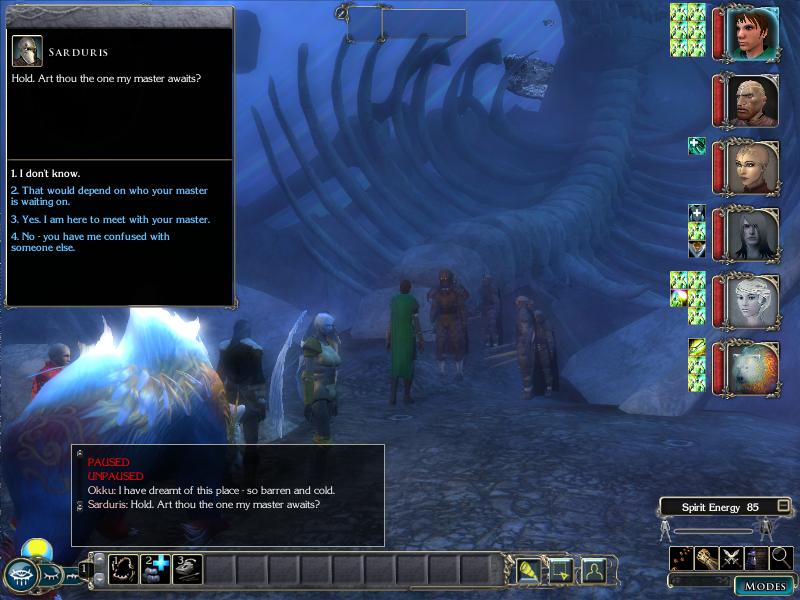
Astral Plane
 : My lord hath commanded me to grant passage to an "old friend." He described this being as one with an appetite that cannot be sated.
: My lord hath commanded me to grant passage to an "old friend." He described this being as one with an appetite that cannot be sated. : He hath seen this person in his dreams, but was uncertain how she would appear when she arrived.
: He hath seen this person in his dreams, but was uncertain how she would appear when she arrived. : I am a spirit-eater. That fits your description.
: I am a spirit-eater. That fits your description. : Yes... I thought I recognized thee. It has been ages.
: Yes... I thought I recognized thee. It has been ages.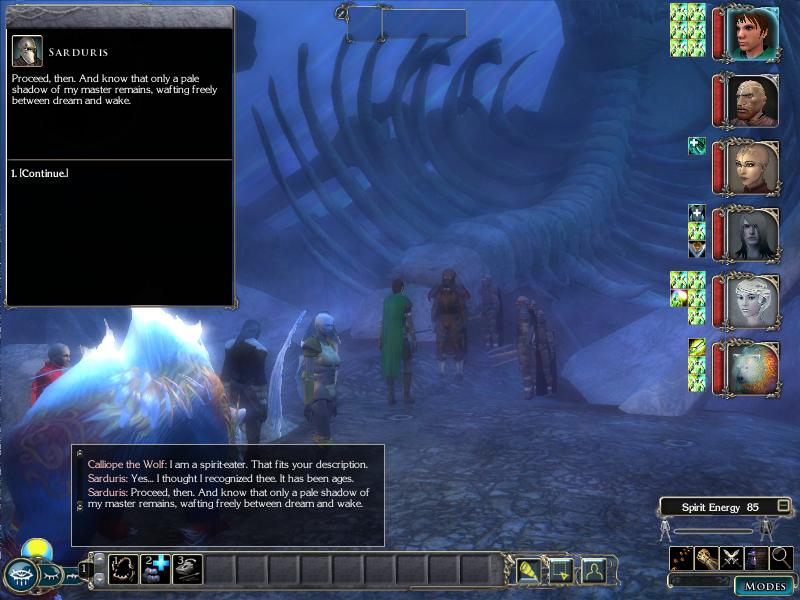
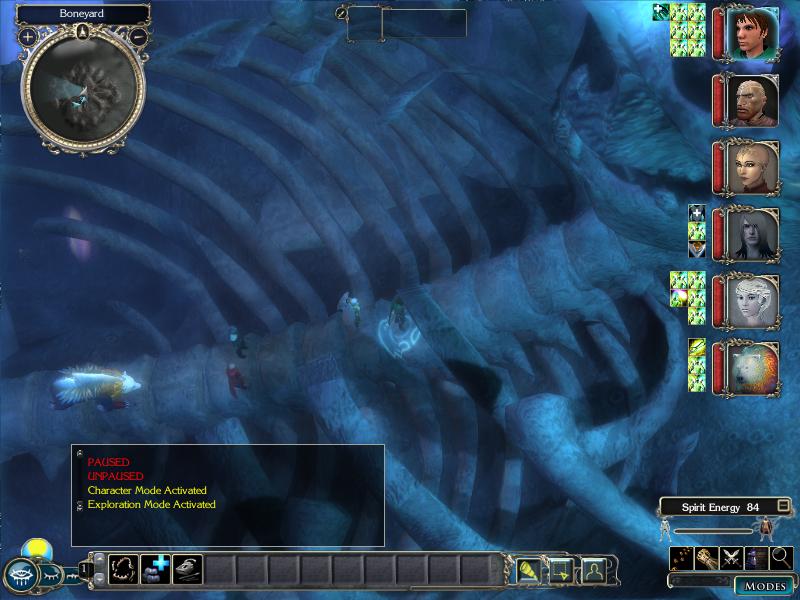
She did it. I don't know how but she did it.
Nefris found a way to speak to Myrkul.
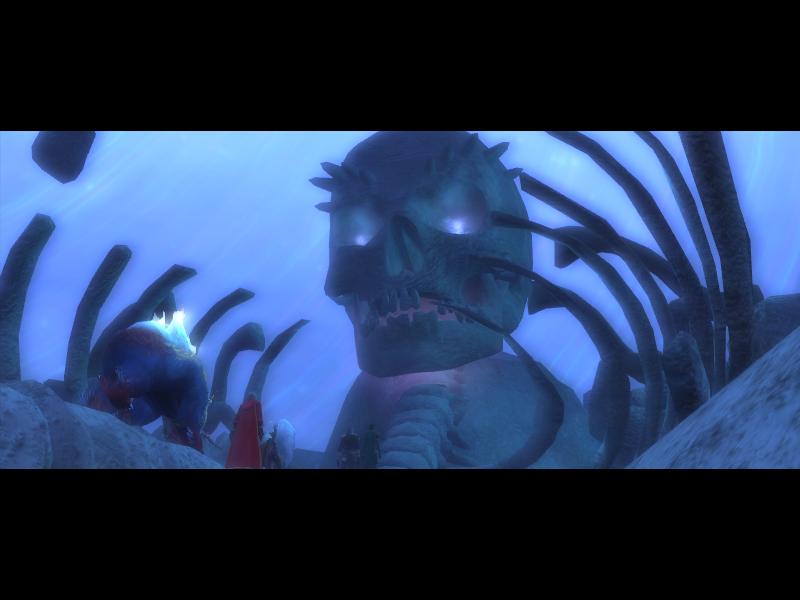


The following conversation with Myrkul is arguably the centrepiece of the entire campaign, on a par with Ravel in Torment or the Jedi Council in KOTOR2. It's really very well done and I strongly recommend watching the videos. It's a long conversation so I've split it into three parts - and I'll be taking a similar approach regarding the screenshot commentary later in the post too.
Myrkul is voiced by S Scott Bullock, and he does an excellent job. Seriously, watch the videos, it's an amazing sequence, really well done in all aspects.
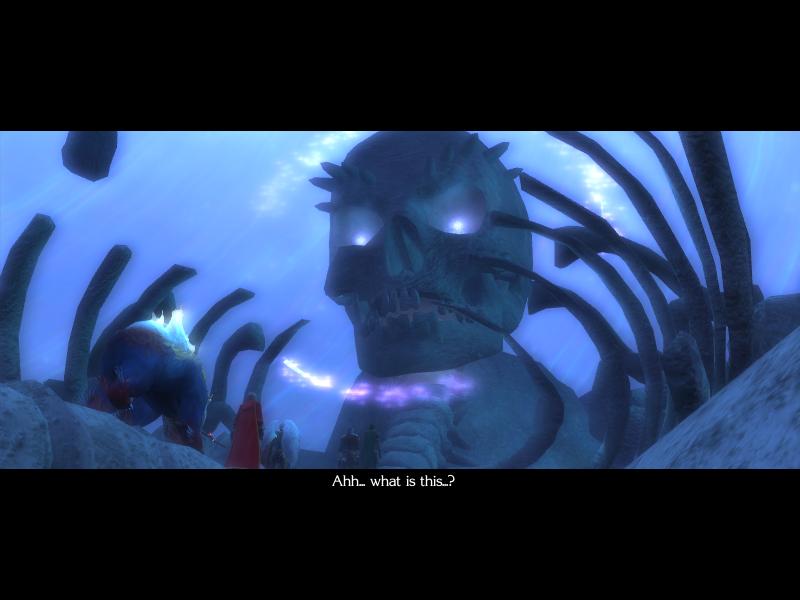
 : Are you a dream? A fantasy? A recollection, spawned of my own dead mind? Yes, you are that, but you are more, too.
: Are you a dream? A fantasy? A recollection, spawned of my own dead mind? Yes, you are that, but you are more, too.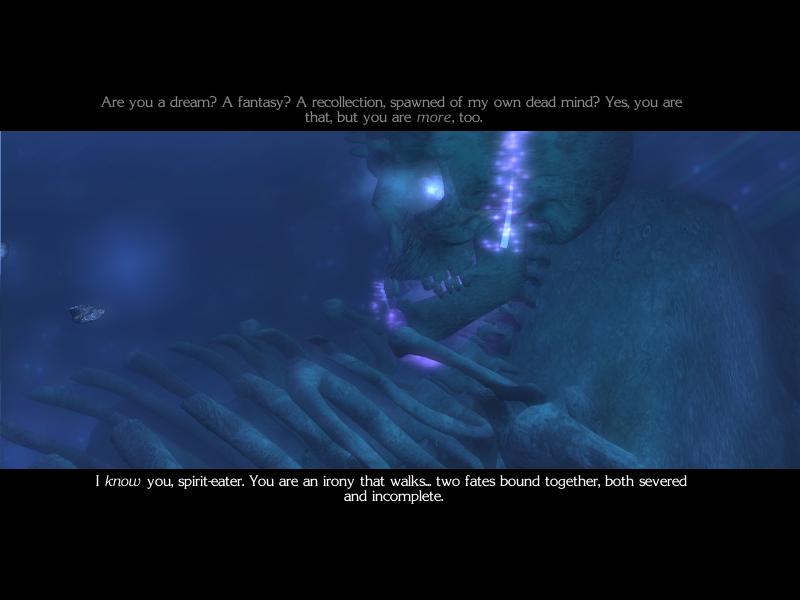
 : And you have brought others... castoffs... discarded souls, such as this priestess.
: And you have brought others... castoffs... discarded souls, such as this priestess.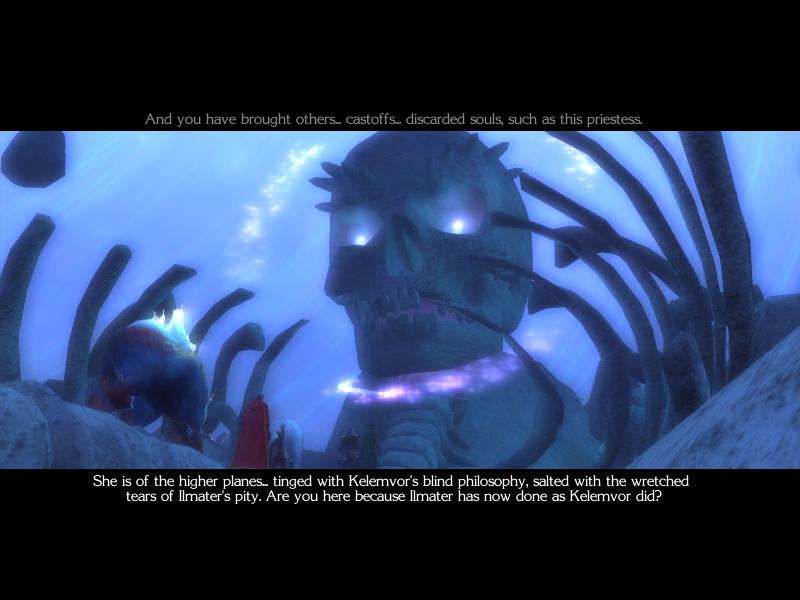
Myrkul will explain most of what's going on in Mask (including how the tale of Akachi relates to our spirit-eater curse) but before that he's going to have a dig at our companions. First up, and most detailed, is Kaelyn.
 : She can answer you as well as I could, dead god.
: She can answer you as well as I could, dead god.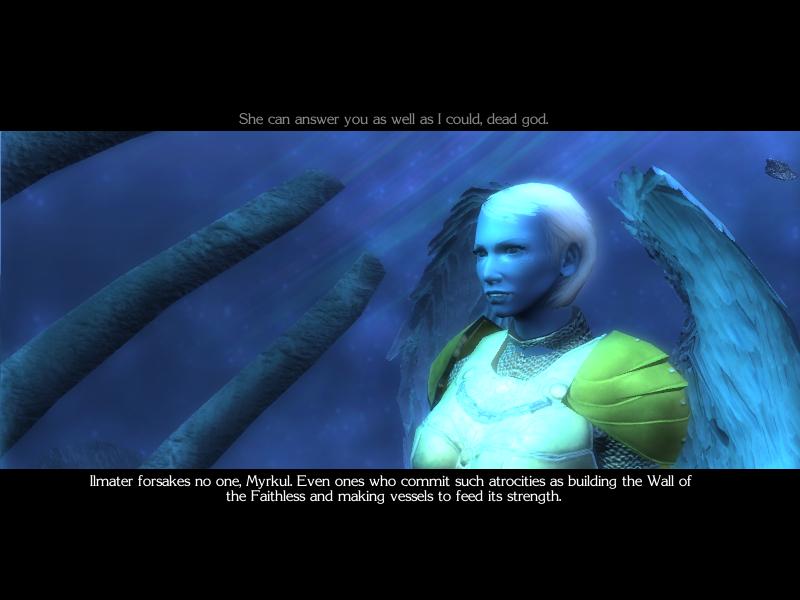
 : Ilmater may take pity on you, little bird, but Kelemvor severed you like a gangrenous hand.
: Ilmater may take pity on you, little bird, but Kelemvor severed you like a gangrenous hand. : He smelled the death of faith upon you - with all his "pragmatism," he can be crueler than I... but he will not rule the dead better for it, I think.
: He smelled the death of faith upon you - with all his "pragmatism," he can be crueler than I... but he will not rule the dead better for it, I think. : He rules the dead now, Myrkul. One could even say he rules dead gods as they drift in this empty place.
: He rules the dead now, Myrkul. One could even say he rules dead gods as they drift in this empty place. : Perhaps. It is an amusing notion. But your life embodies an irony of Kelemvor as well.
: Perhaps. It is an amusing notion. But your life embodies an irony of Kelemvor as well. : And what "irony" do you speak of?
: And what "irony" do you speak of?
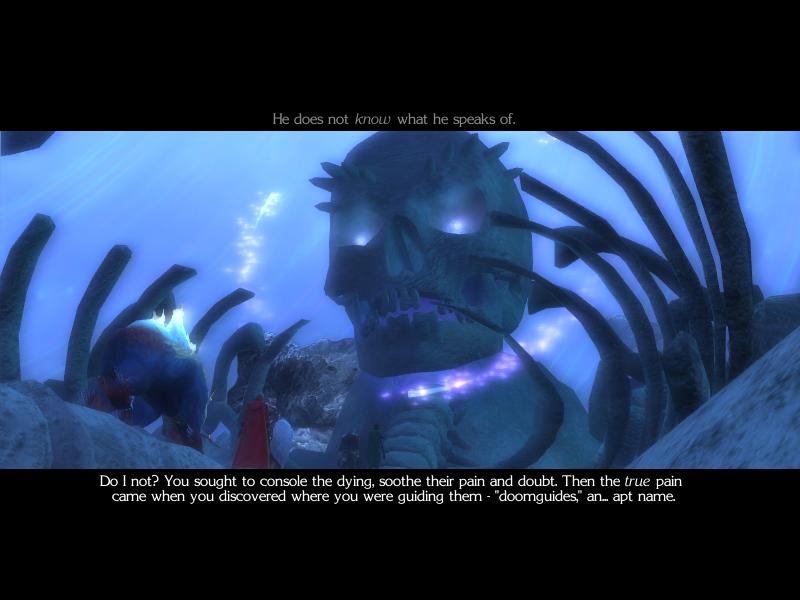
 : What matters in healing their pain if the true agony is to come? That is what awaits them on my Wall.
: What matters in healing their pain if the true agony is to come? That is what awaits them on my Wall. : It is only a structure. It will not survive time and faith. It will not survive me.
: It is only a structure. It will not survive time and faith. It will not survive me. : She is correct. It is our intention to tear down the Wall of the Faithless.
: She is correct. It is our intention to tear down the Wall of the Faithless.
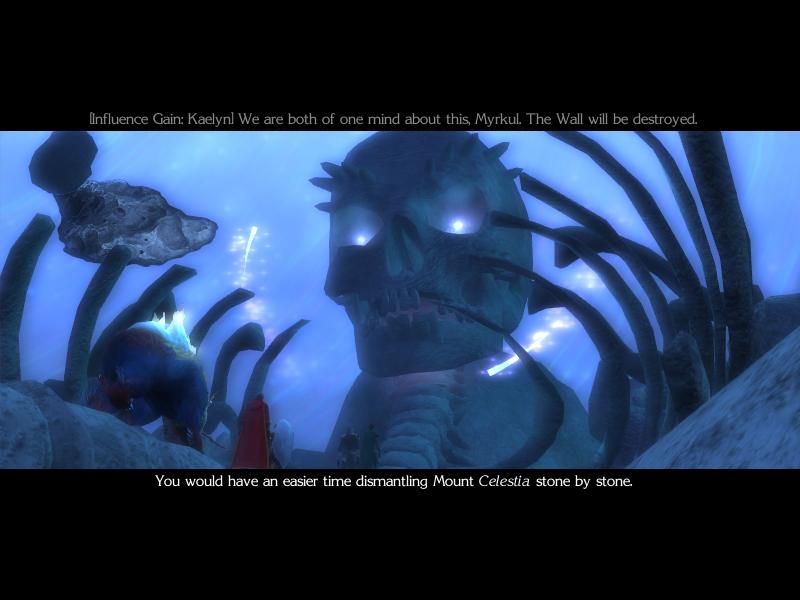
 : Ritual and circumstance are not easily undone, little bird. And they are rarely accomplished by peace.
: Ritual and circumstance are not easily undone, little bird. And they are rarely accomplished by peace. : Will you lead the living to slaughter and die for those already lost? What a sacrifice for you to demand of those who blindly follow you.
: Will you lead the living to slaughter and die for those already lost? What a sacrifice for you to demand of those who blindly follow you. : Time and justice favor me. You know not what you say, Myrkul.
: Time and justice favor me. You know not what you say, Myrkul. : I know this... I know your Grandfather came to your god Kelemvor in secret. Before you mounted your "great crusade."
: I know this... I know your Grandfather came to your god Kelemvor in secret. Before you mounted your "great crusade." : What do you mean?
: What do you mean?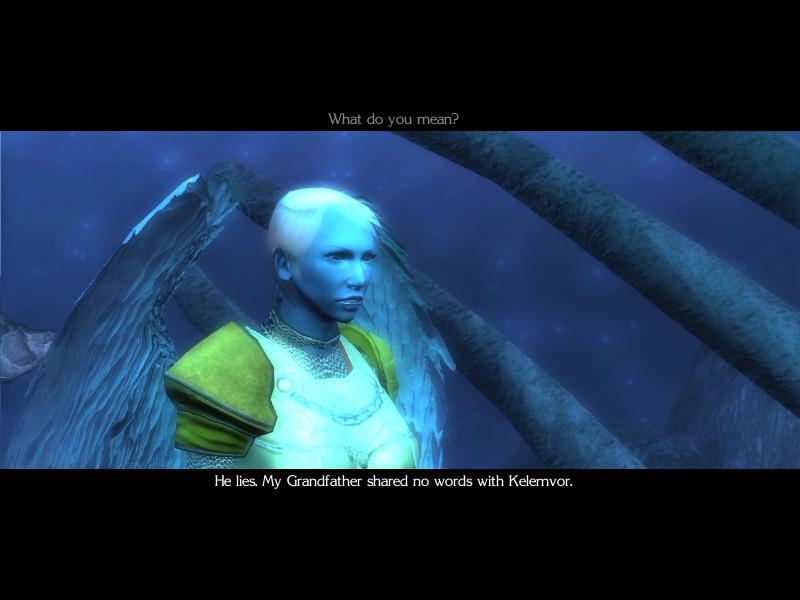
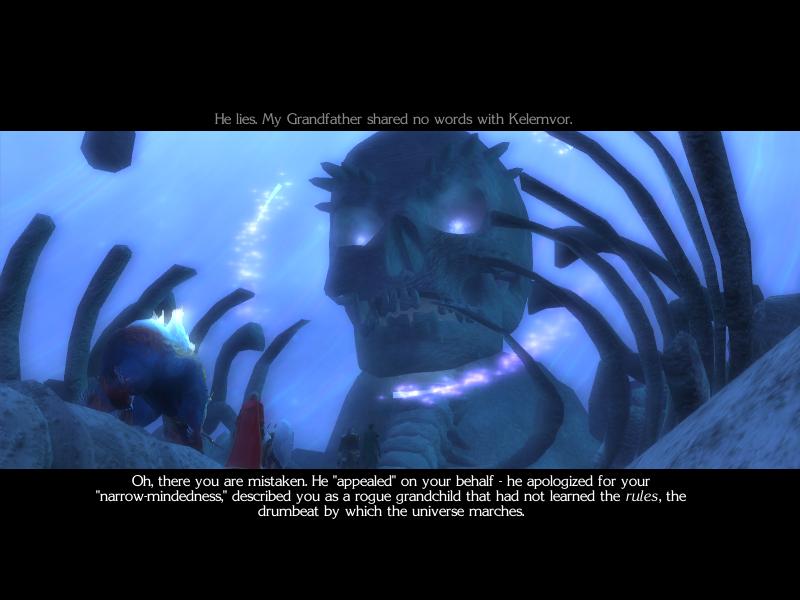
 : Your own blood condemned you. But it was only a small punishment, was it not? You had already discovered how thin the cloak of Kelemvor's faith was - it does not keep out the cold, not at all.
: Your own blood condemned you. But it was only a small punishment, was it not? You had already discovered how thin the cloak of Kelemvor's faith was - it does not keep out the cold, not at all. : His punishment cast you out of his halls, sealed the door of your home to you - never again will you walk on the slopes of Mount Celestia, hear the chorus in the House of the Triad.
: His punishment cast you out of his halls, sealed the door of your home to you - never again will you walk on the slopes of Mount Celestia, hear the chorus in the House of the Triad. : You are an angel left to walk the earth, with only her burning need for justice to keep her warm. A fairy tale with a bright beginning and a fiery end, I think.
: You are an angel left to walk the earth, with only her burning need for justice to keep her warm. A fairy tale with a bright beginning and a fiery end, I think.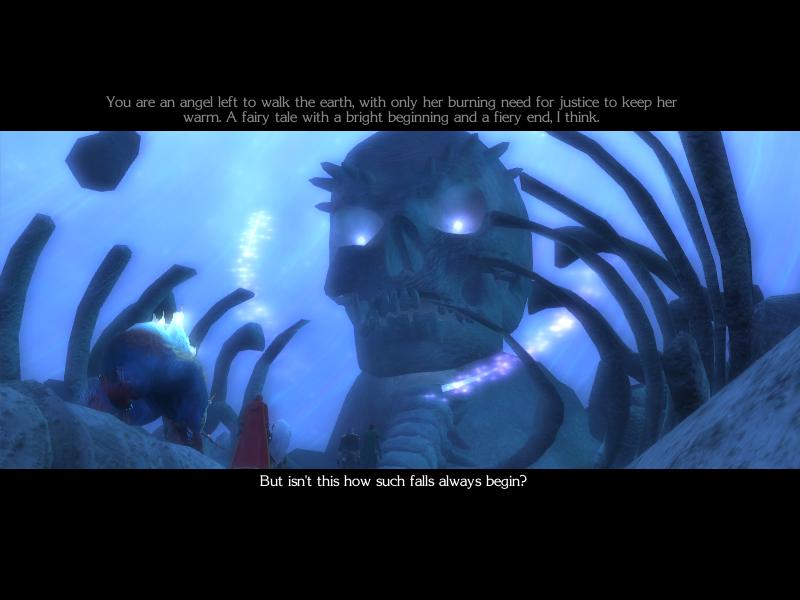
 : She has not fallen, Myrkul, for she has not given up, and neither have I.
: She has not fallen, Myrkul, for she has not given up, and neither have I. : The one I follow speaks in better words than I, but I share their strength.
: The one I follow speaks in better words than I, but I share their strength. : Some fall, it is true, but others, victory and justice sustain them until they reach the gates of their enemy.
: Some fall, it is true, but others, victory and justice sustain them until they reach the gates of their enemy. : Hnnn... a crusader's heart. Follow the same path, and the destination shall be no different, little "dove."
: Hnnn... a crusader's heart. Follow the same path, and the destination shall be no different, little "dove."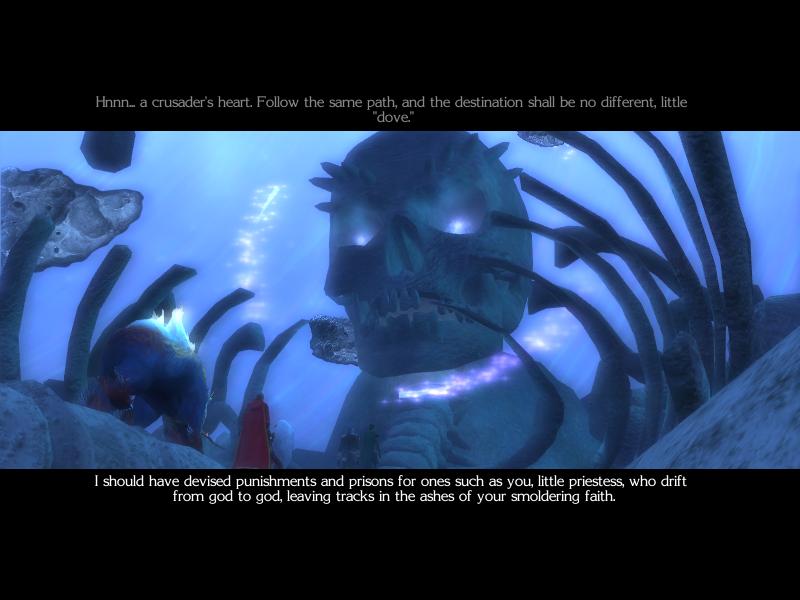
 : Your Wall of the Faithless will not endure, Myrkul. Like you, it will die in time.
: Your Wall of the Faithless will not endure, Myrkul. Like you, it will die in time. : I have accepted death. You, however... perhaps in guarding death's kingdom, you thought such fates were beneath you.
: I have accepted death. You, however... perhaps in guarding death's kingdom, you thought such fates were beneath you. : Who has fallen now?
: Who has fallen now?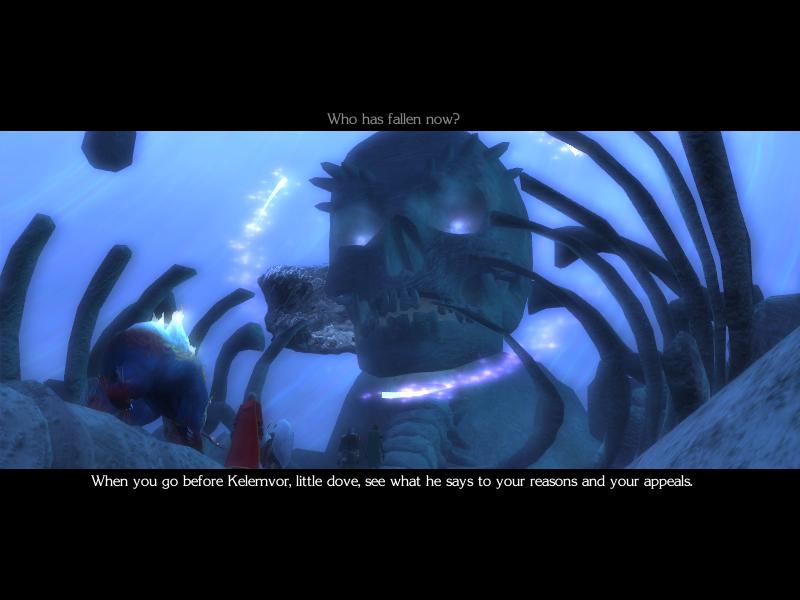
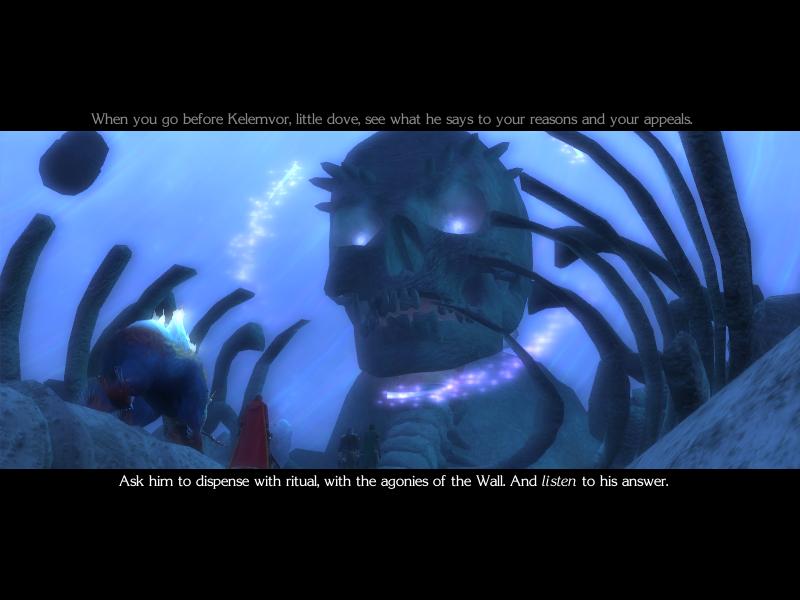
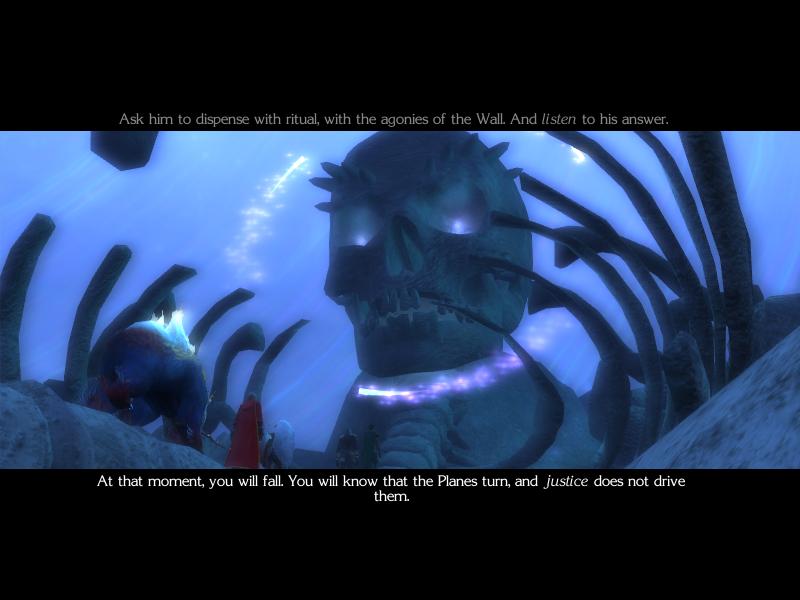
 : Once you were the lord of decay, of corruption, of wasting away... and now you are at the mercy of all those things. It makes me suspect the universe is just.
: Once you were the lord of decay, of corruption, of wasting away... and now you are at the mercy of all those things. It makes me suspect the universe is just. : Like your former god, you favor blunt action and brute force, with little regard for what such actions cause farther down the road. And perhaps what you see is not justice, but only amusement and irony... two things which I value more.
: Like your former god, you favor blunt action and brute force, with little regard for what such actions cause farther down the road. And perhaps what you see is not justice, but only amusement and irony... two things which I value more.* * *
Wow. Poor Kaelyn.
You'd think that an audience with God would leave you feeling better about yourself... ah, but this is Myrkul we're talking about. God of the dead? More like the god of irony.
There's a rich history of cosmic irony in ancient myths and legends. Everyone loves a good self-fulfilling prophecy - the most famous probably being the story of Oedipus. Or maybe you've heard of The Gift of the Magi, a story about a poor husband who sells his watch to buy his wife a set of combs, only to learn she sold her hair to the wigmakers to buy him a chain for his watch.
Myrkul would rather he were the victim of irony than justice; he'd prefer to think of his slow, rotting death on the Astral Plane as something sadly amusing, rather than a punishment for a divinity of cruelty.
But maybe he's right? For all his love of irony, he means only "things that are coincidental/incongruous." The original meaning of the word describes the event when someone says the opposite of what they mean - and in this sense, Myrkul is not ironic at all. Myrkul is yet another stand-in for God, and one of the key attributes of God is his superior, innate, complete and true knowledge of everything. Every word he speaks is truth, for a given value of truth.
Which puts an interesting spin on Kaelyn's Crusade. So far, the only person who has voiced opposition to her Crusade is Darovik, the priest of Kelemvor in Mulsantir, and his motivations are suspect. But here we have Myrkul, all-knowing and all-seeing, long past caring about the Wall, tearing into Kaelyn for her naivety. Kaelyn's mistake is that the Wall of the Faithless was never about justice, or punishing the Faithless; if she frames it in such terms then of course it's going to be unjust.
She's like those people that expect militaries to be honourable and governments to be fair - that's not what they're for. The Wall is a club, a weapon for belief (and specifically for belief in Myrkul). What Kaelyn hasn't realised is that her root concern is the nature of faith and the demands it makes on believers. If you think that faith is necessary - definitely a valid position in the Forgotten Realms - then the Wall is also necessary and thus justified; if you don't, then the Wall is unnecessary and unjustifiable. Kaelyn has yet to understand this and this is a source of great amusement for the former god of the dead.
All right, Myrkul's not exactly unbiased; it was his Wall after all. He's also the sort of person that'd say anything to get a rise out of someone, especially a Neutral Good half-celestial. But I don't think Myrkul is lying here - in fact, he's entirely truthful throughout the entire encounter. As we'll hear later: why lie when a truth is so much crueler instead?
* * *
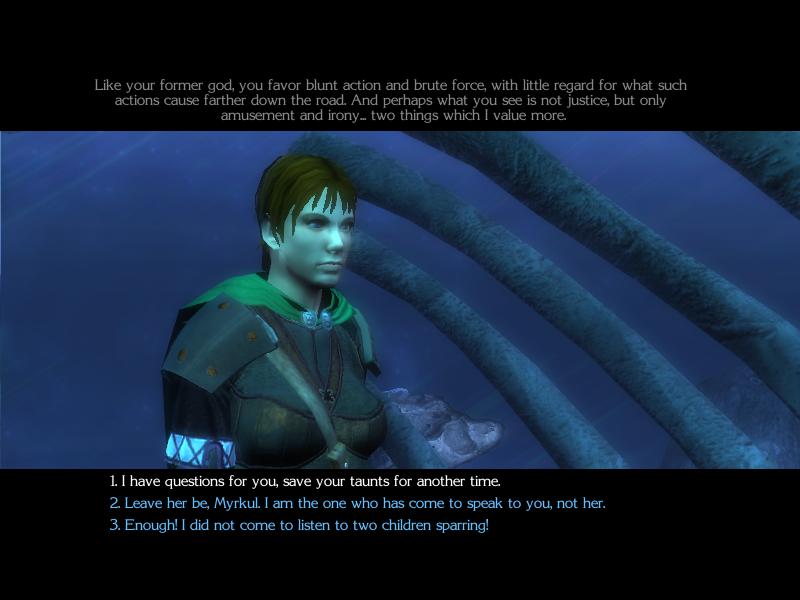
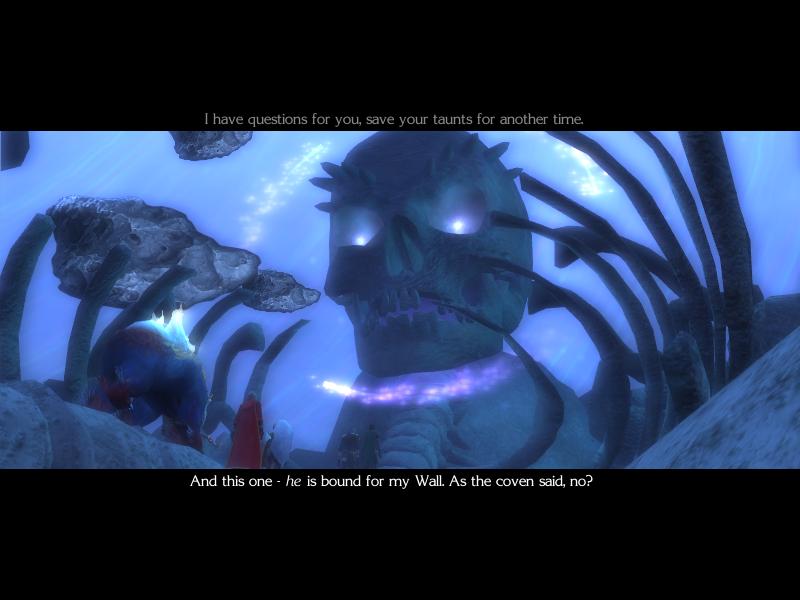
Now it's Gann's and Safiya's turn.
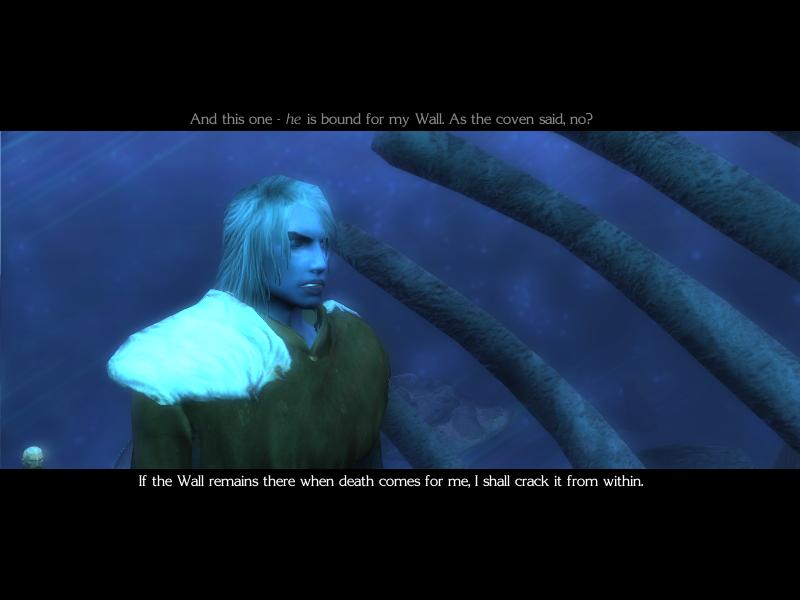
 : Braver and stronger have tried, spawn of hags. Despite your ego, the universe does not bend to your whims... and it is I who set the rules long ago.
: Braver and stronger have tried, spawn of hags. Despite your ego, the universe does not bend to your whims... and it is I who set the rules long ago. : But you still do not believe in gods or faith, even as you look upon my corpse.
: But you still do not believe in gods or faith, even as you look upon my corpse.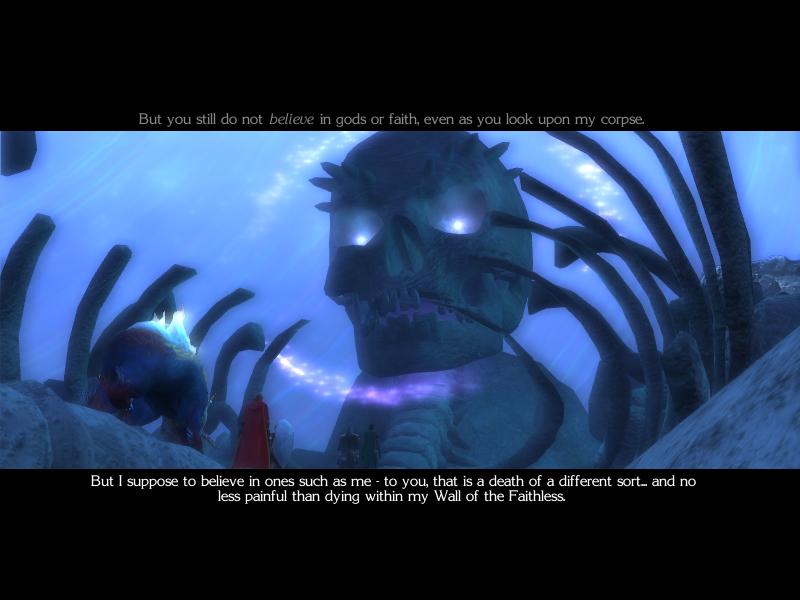
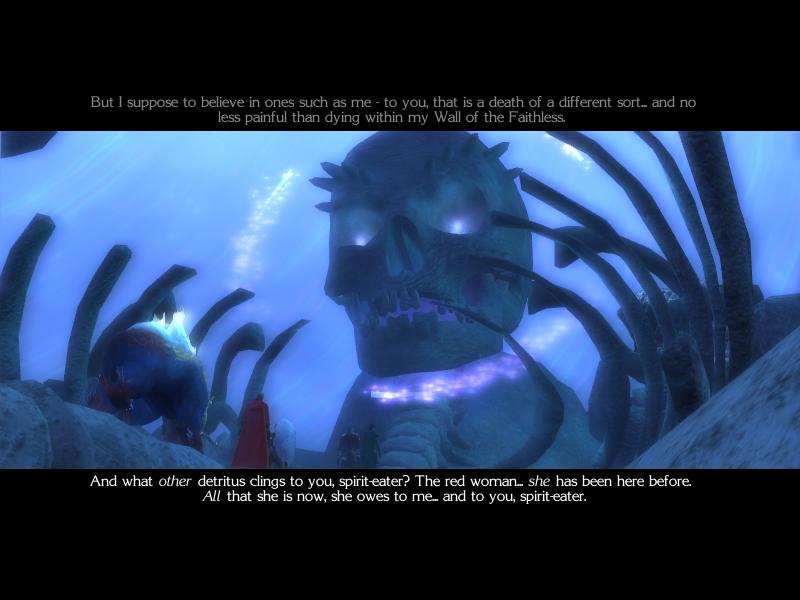
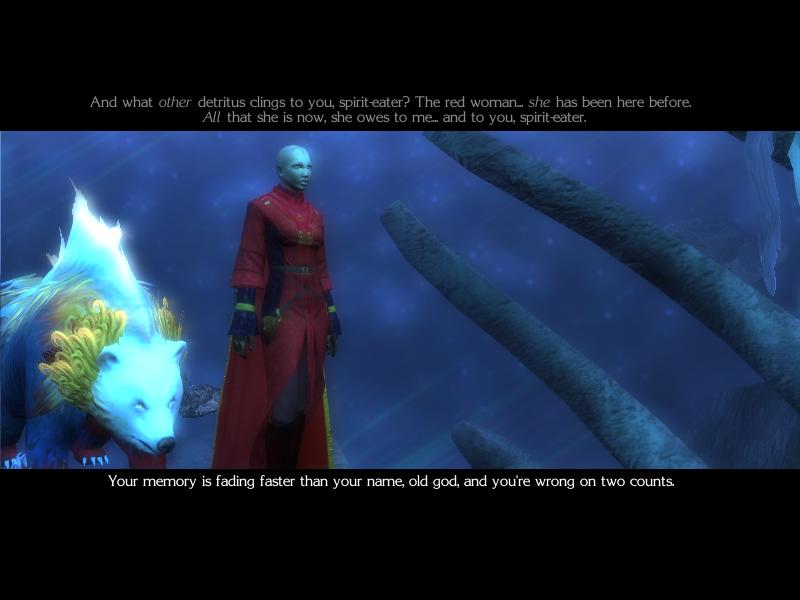
 : First, I have never been to the Astral realm before this moment, so this is not a reacquaintance. And second - I owe you nothing.
: First, I have never been to the Astral realm before this moment, so this is not a reacquaintance. And second - I owe you nothing. : But you stood before me just a short time ago, red woman, burning with rage and love in equal measure.
: But you stood before me just a short time ago, red woman, burning with rage and love in equal measure. : What a shattered thing you have become... as ignorant of your own nature as the one who leads you. If only your beloved had accepted my judgement of you, your suffering might have ended long ago.
: What a shattered thing you have become... as ignorant of your own nature as the one who leads you. If only your beloved had accepted my judgement of you, your suffering might have ended long ago.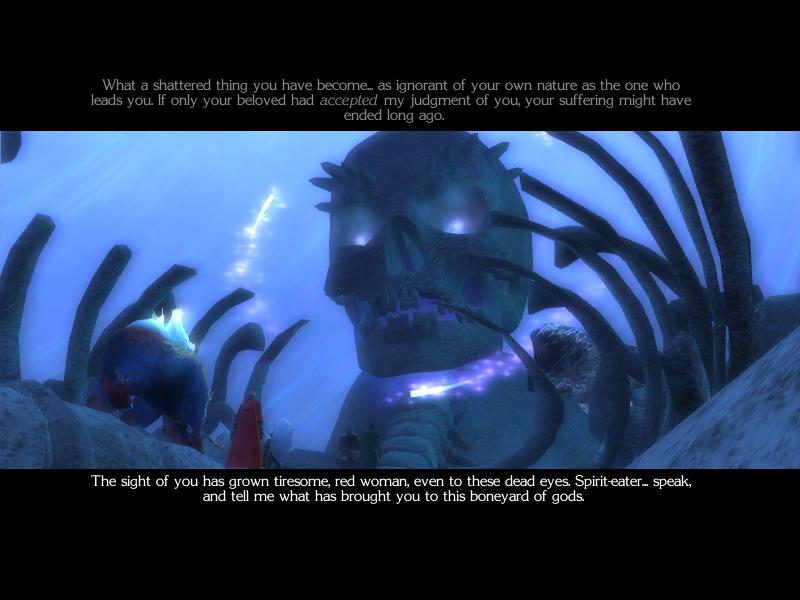
Okay, back to the main event. Myrkul's been wrapped up in this since day one, when we found the Old Man's book in the camp in Okku's barrow. Let's quiz him.
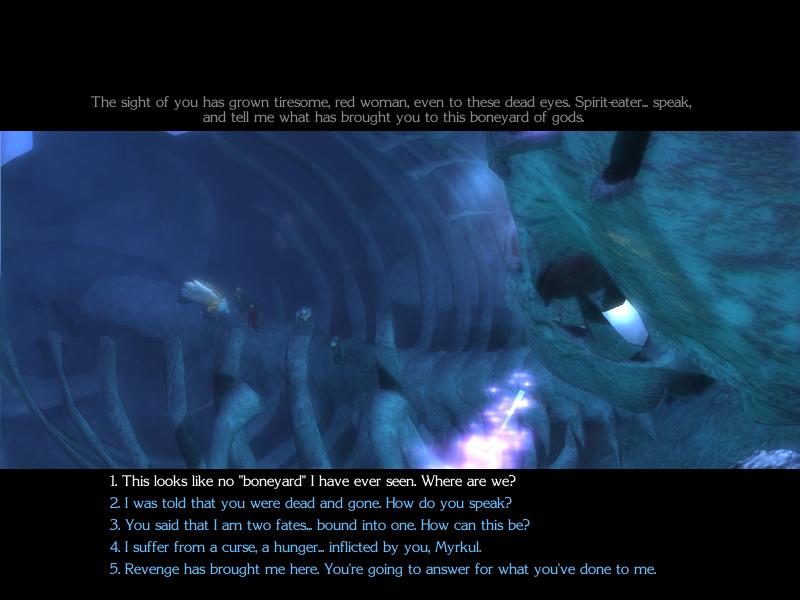
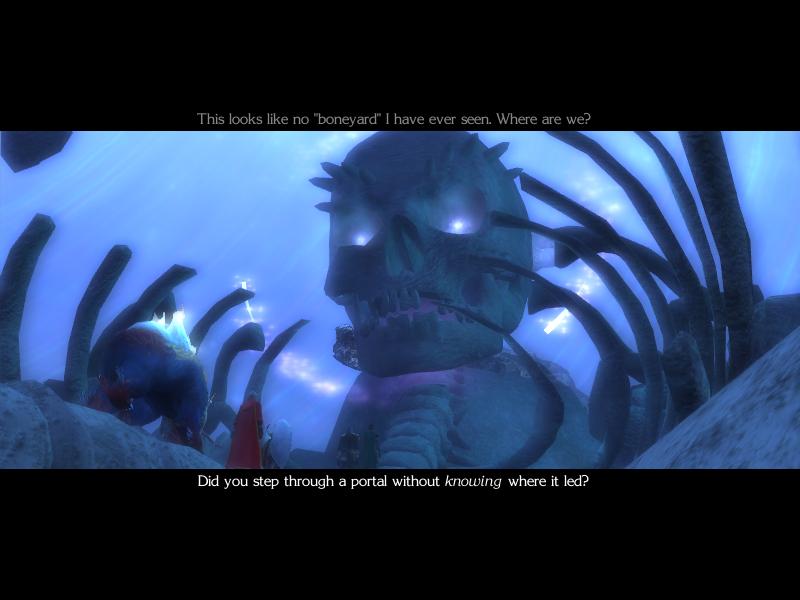
 : We are between the planes, spirit-eater... in a crossroad of sorts. An infinite sky, where sensation and dream are sharpened to an edge...
: We are between the planes, spirit-eater... in a crossroad of sorts. An infinite sky, where sensation and dream are sharpened to an edge... : ...and a charnel house, for gods who are dead.
: ...and a charnel house, for gods who are dead.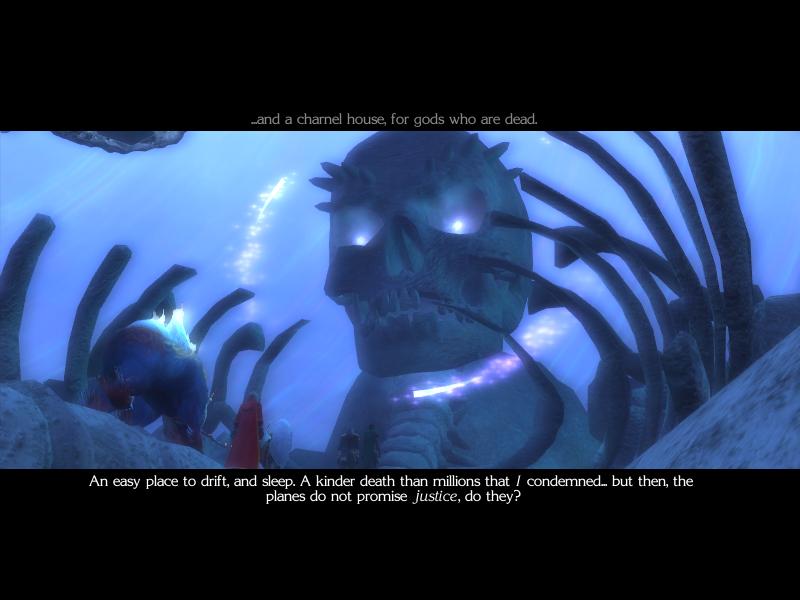
 : I was told that you were dead and gone. How do you speak?
: I was told that you were dead and gone. How do you speak? : A god does not easily die... he lives in the fears of him, which linger on... in the doubts that he is truly gone... and in the suffering of those whose lives he brought to grief.
: A god does not easily die... he lives in the fears of him, which linger on... in the doubts that he is truly gone... and in the suffering of those whose lives he brought to grief.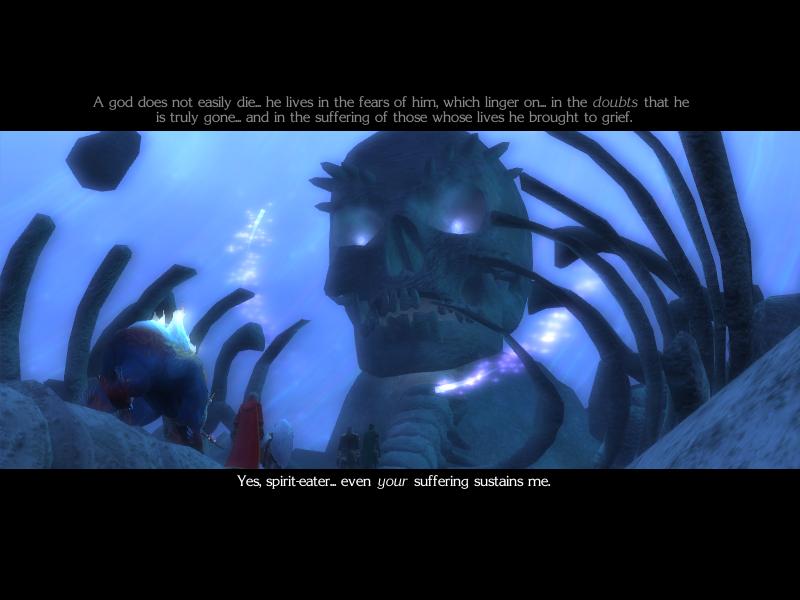
 : Every anguish that you sow, you unknowingly dedicate to me. Every mortal who cowers or cringes at your name... they are also cringing at mine.
: Every anguish that you sow, you unknowingly dedicate to me. Every mortal who cowers or cringes at your name... they are also cringing at mine. : With every such pain, the embers of my soul burn a little brighter than before.
: With every such pain, the embers of my soul burn a little brighter than before.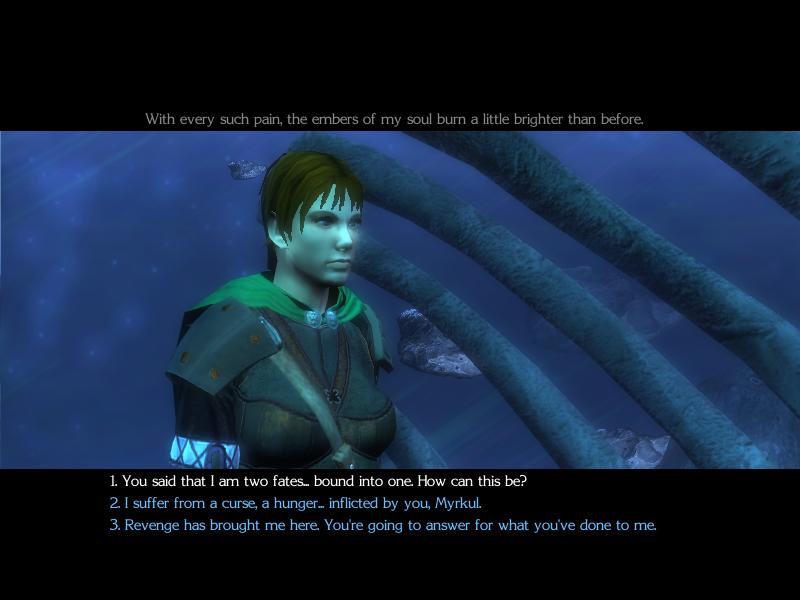
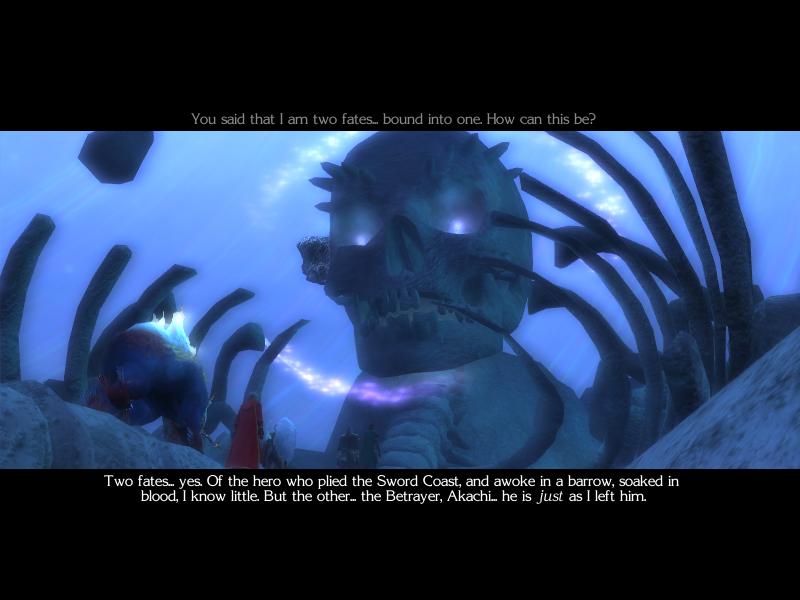
 : He is empty now... a ravening void that seeks always to fill itself up... to regain what the Wall took from him.
: He is empty now... a ravening void that seeks always to fill itself up... to regain what the Wall took from him. : So he steals what he lost... a face, a body, a name. These are a mask to be worn for a time, until they are also devoured by his unending hunger.
: So he steals what he lost... a face, a body, a name. These are a mask to be worn for a time, until they are also devoured by his unending hunger. : You're saying that I am the Betrayer's newest mask.
: You're saying that I am the Betrayer's newest mask. : For now, yes. He has worn many such masks... and he will wear countless more, once you are gone.
: For now, yes. He has worn many such masks... and he will wear countless more, once you are gone.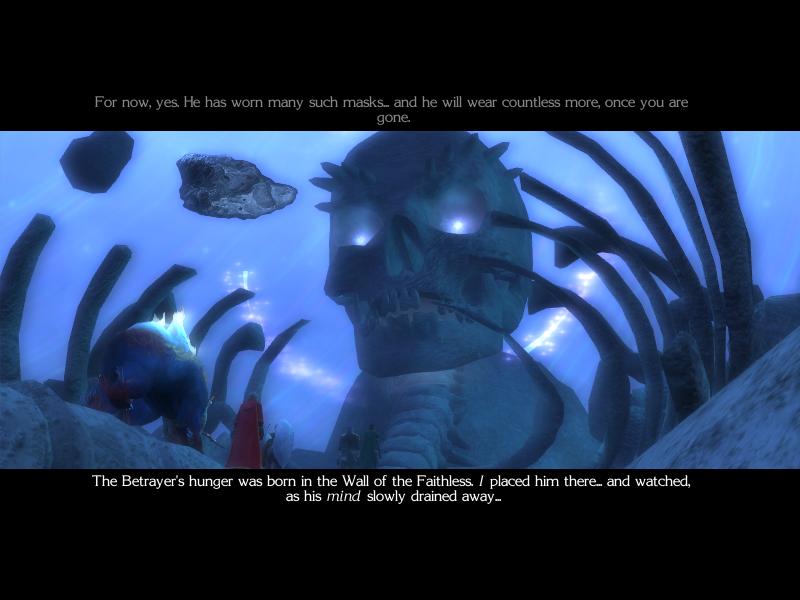
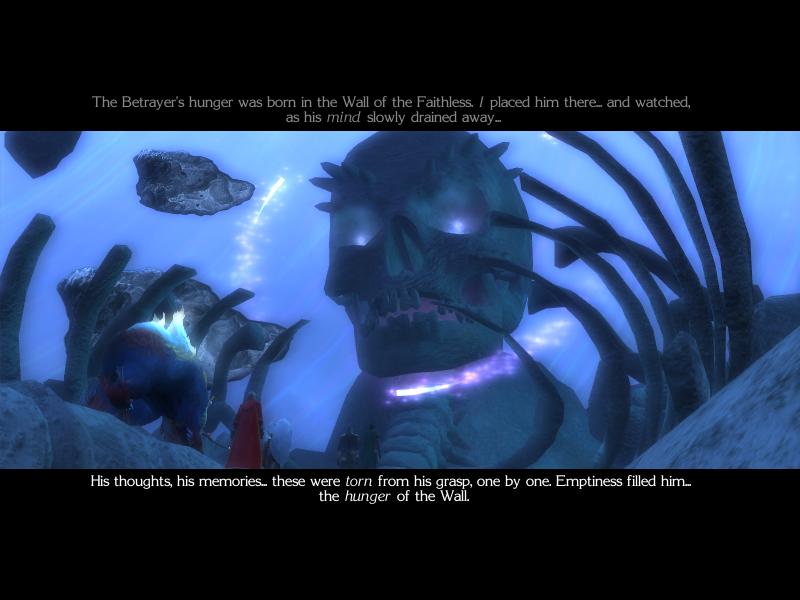
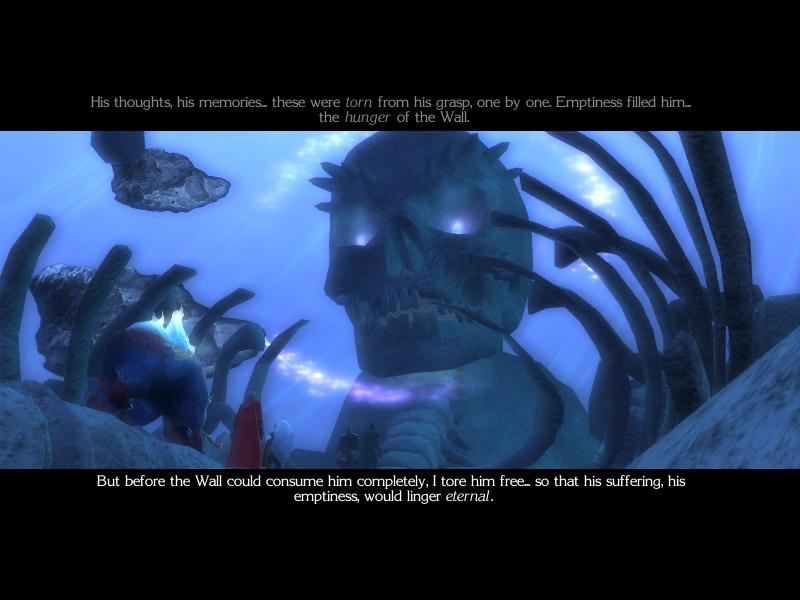
 : Why would the Betrayer choose me for his mask?
: Why would the Betrayer choose me for his mask? : Oh, it was no matter of choice... the Betrayer has become an empty, mindless thing. When he devours one mask, he simply waits for the next to appear.
: Oh, it was no matter of choice... the Betrayer has become an empty, mindless thing. When he devours one mask, he simply waits for the next to appear.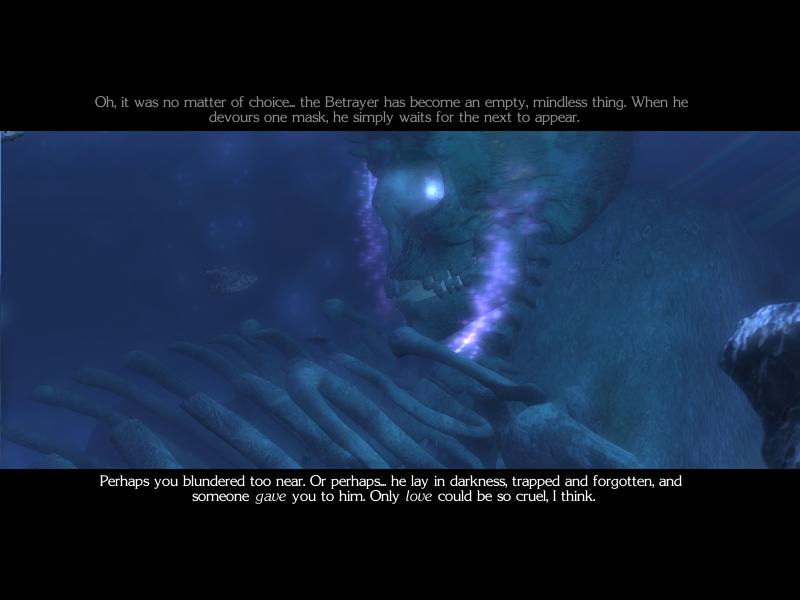
These words are important! There's a reason I titled the thread after this line!
 : What crime did Akachi commit?
: What crime did Akachi commit? : He raised an army. Marched against the realm of the dead, against his god. Is that not crime enough?
: He raised an army. Marched against the realm of the dead, against his god. Is that not crime enough? : But why? For what purpose?
: But why? For what purpose?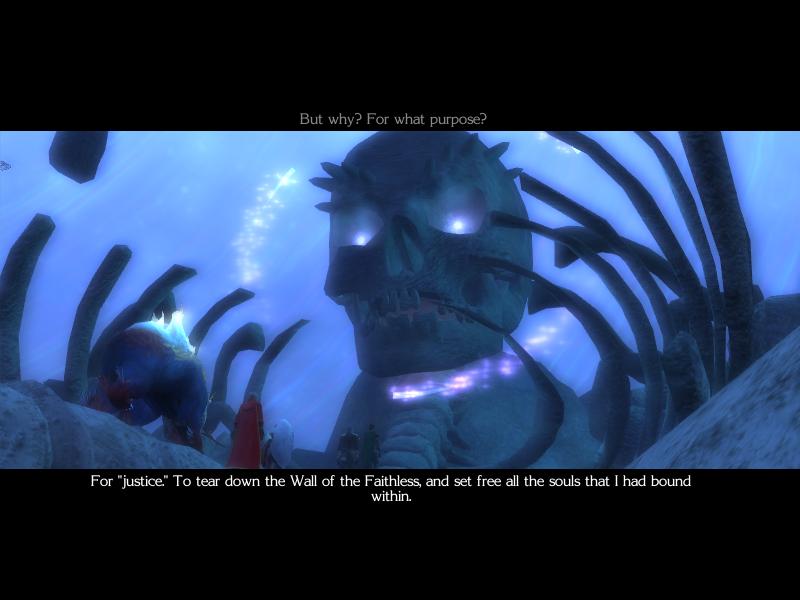
 : To defy the order of the planes, the compact between mortals and gods.
: To defy the order of the planes, the compact between mortals and gods. : Still... I think you're leaving something out. Why would one of your priests turn against you, with no warning?
: Still... I think you're leaving something out. Why would one of your priests turn against you, with no warning? : Do not presume to hurl blame at my door, spirit-eater. I cannot account for the treacheries of every mortal soul... only for their consequences.
: Do not presume to hurl blame at my door, spirit-eater. I cannot account for the treacheries of every mortal soul... only for their consequences.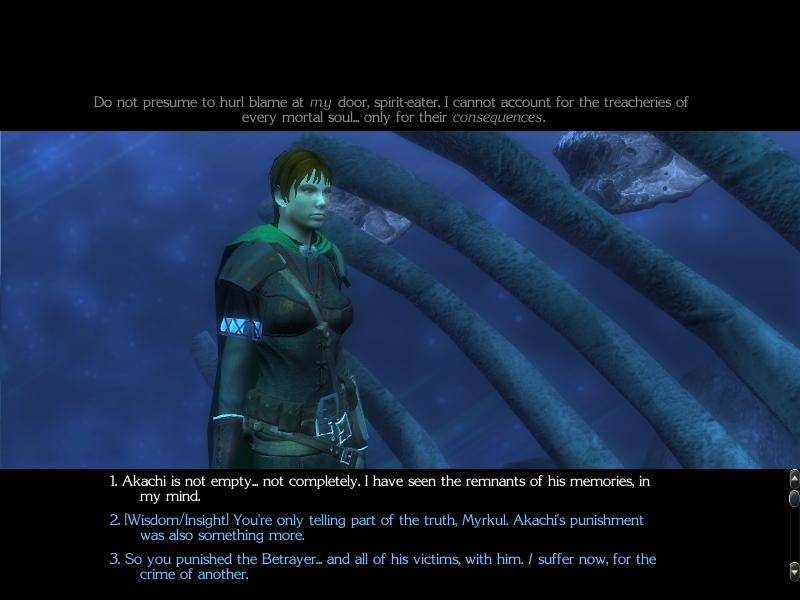
 : Oh? You have seen delusions, perhaps... the spawn of your desparate mind.
: Oh? You have seen delusions, perhaps... the spawn of your desparate mind.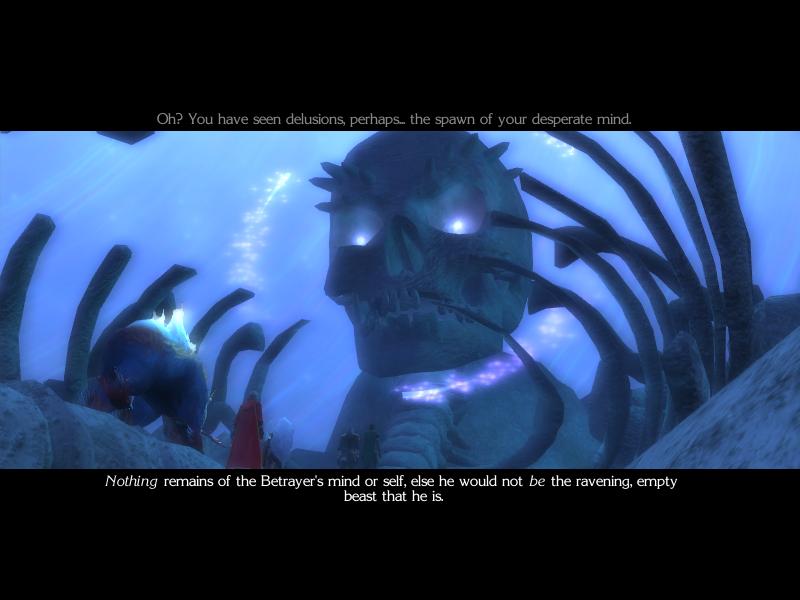
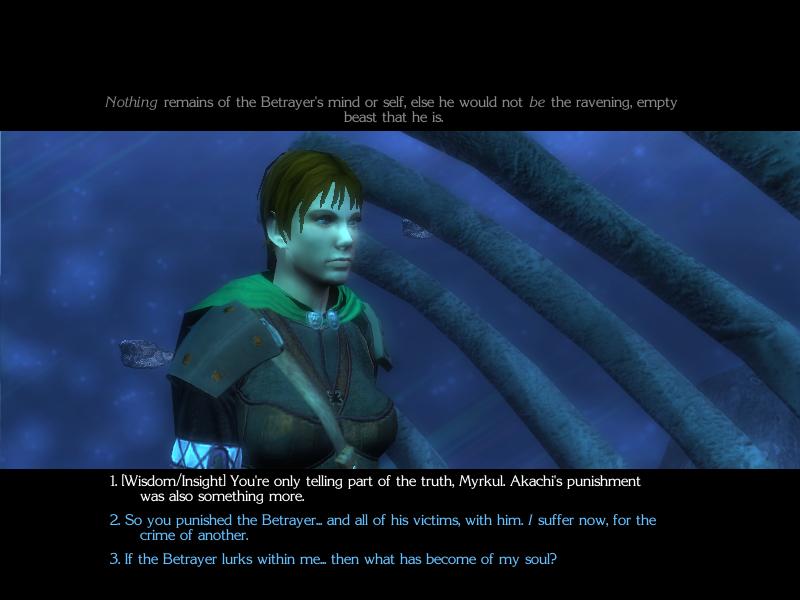
 : Was it, then?
: Was it, then? : [Wisdom/Insight] You said that my suffering helps keep you alive. That my hunger sows fear and pain, and these sustain you.
: [Wisdom/Insight] You said that my suffering helps keep you alive. That my hunger sows fear and pain, and these sustain you. : I said those things... yes. If you are so clever, spirit-eater, then make your point.
: I said those things... yes. If you are so clever, spirit-eater, then make your point.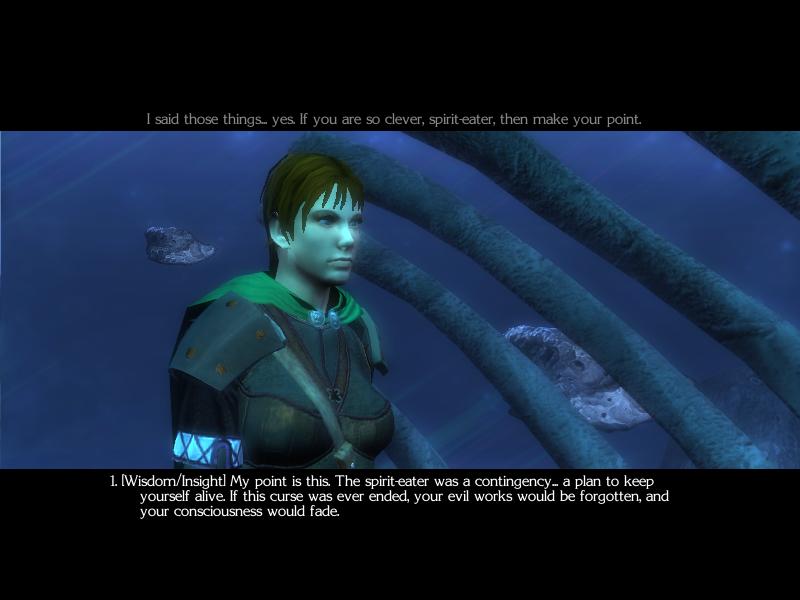
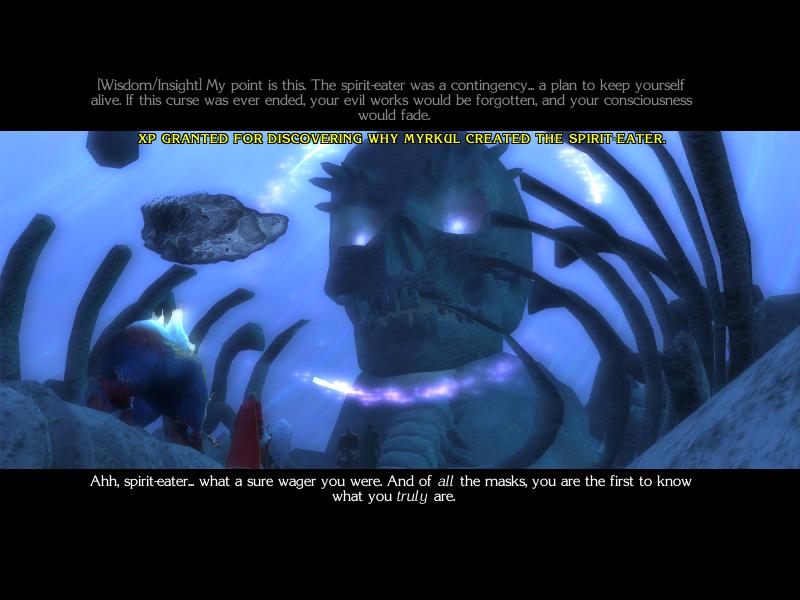
 : Two faces, bound together. One betrayed my faith, the other never worshipped me at all. Together, you are my truest disciple.
: Two faces, bound together. One betrayed my faith, the other never worshipped me at all. Together, you are my truest disciple. : The irony is deep, and worthy of a god's devising.
: The irony is deep, and worthy of a god's devising.* * *
"Given value of truth," I said. We'll come back to Myrkul's part in Akachi's betrayal later.
But what a revelation! Finally we understand why the game is called Mask of the Betrayer. Finally we know Akachi's connection to our predicament.
It's taken long enough. Most of Act 2 was us being passed from module to module, slowly learning a small amount about our condition each time - only now do we actually discover useful information. Quite a lot of it, too... like why Myrkul prizes irony so highly. I suppose being an ascended-necromancer-turned-death-god would predispose one to cynicism, along with being witness to the petty hypocrisies of millions of mortals - nevermind the grievous betrayal of his high priest, supposedly for "justice." And as a god, Myrkul sees the greatest irony of all: the laws that provide the basis for Kaelyn's vaunted justice are the same laws that cause so much injustice in the world.
It's funny that Myrkul is so honest with us, so forthcoming. Myrkul was a seriously unpleasant god; the whole reason Myrkul is dead is because he stole the Tablets of Fate from the Overgod, Ao, and got himself killed in a duel while forced into a mortal body in Faerun. He's a villain, not just in the sense of being a general antagonist-god for the Forgotten Realms pre-3rd-Edition but also in the sense that he's the villain of Mask of the Betrayer.
Or one of them, at least. There's about three antagonist-figures in Mask, but arguably none of them are completely at fault. I mean, obviously Myrkul, the first of the three, is a total asshole... but he technically didn't do anything except turn Akachi into the spirit-eater, which while a horrible thing to do is within his rights as a god, as Akachi's god and as god of the dead to do. And as for the other two... one is responsible for giving us over to the spirit-eater curse, but for the best of reasons, while the other is just trying to do his job as best he can while dealing with the fallout from the plotting of the other two.
But my point is that it's strange we can trust Myrkul so fully in this. Almost... ironic.
* * *
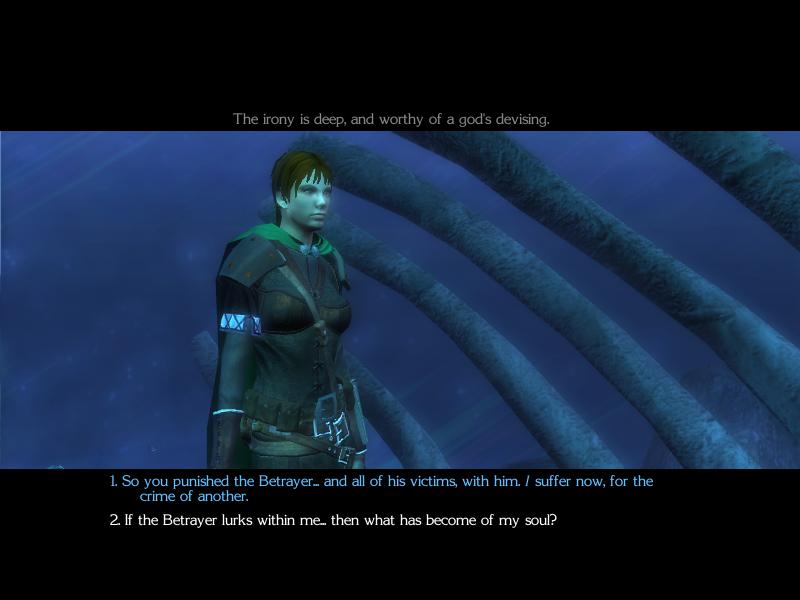
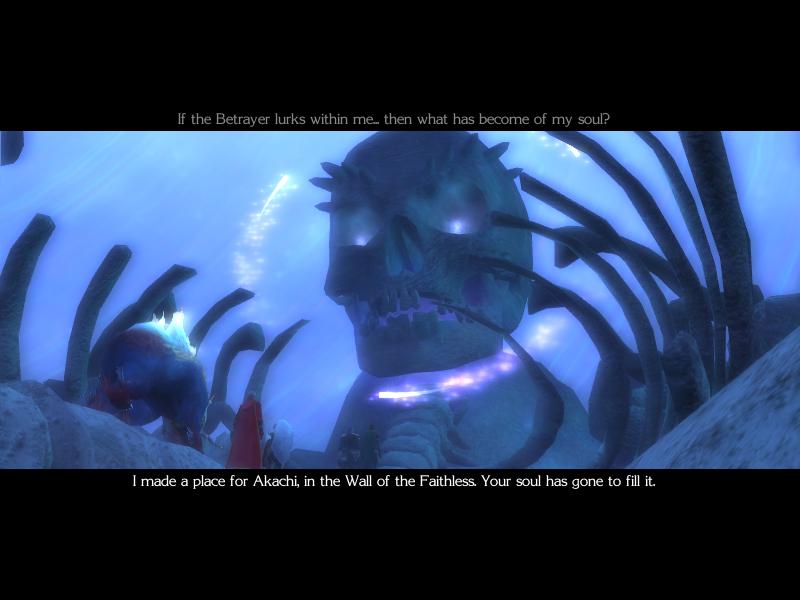
 : When the Betrayer's hunger finally consumes your body and mind, then your soul will dissolve into the Wall, and you will be no more.
: When the Betrayer's hunger finally consumes your body and mind, then your soul will dissolve into the Wall, and you will be no more. : To reclaim your soul, to tear it from the Wall... only in that impossibility might you find your salvation.
: To reclaim your soul, to tear it from the Wall... only in that impossibility might you find your salvation.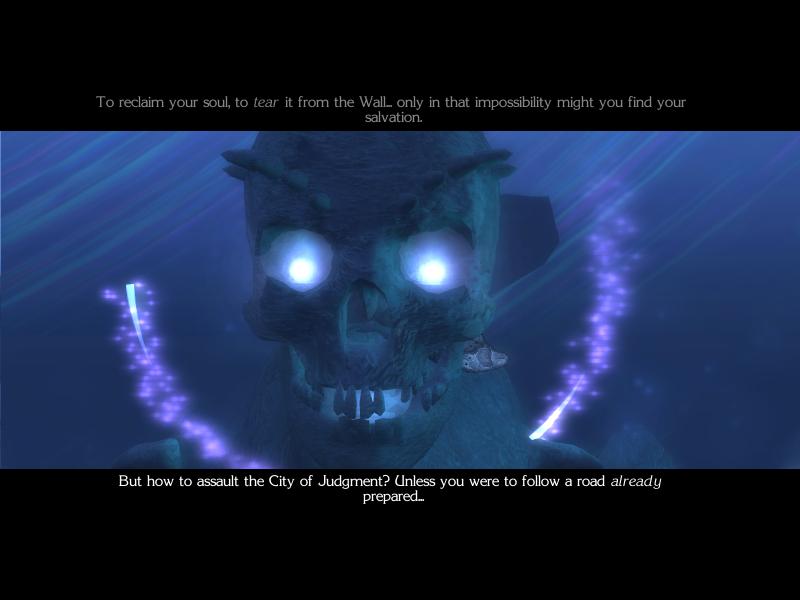
 : What "road" is that?
: What "road" is that? : Have you not laid eyes upon my Vault, in the shadows of Mulsantir? Akachi defiled my sacred place... built a doorway in its depths, to connect the living world with the kingdom of the dead.
: Have you not laid eyes upon my Vault, in the shadows of Mulsantir? Akachi defiled my sacred place... built a doorway in its depths, to connect the living world with the kingdom of the dead. : You have seen that doorway in your dreams. Its key is a Sword... a silver blade that knows you well.
: You have seen that doorway in your dreams. Its key is a Sword... a silver blade that knows you well.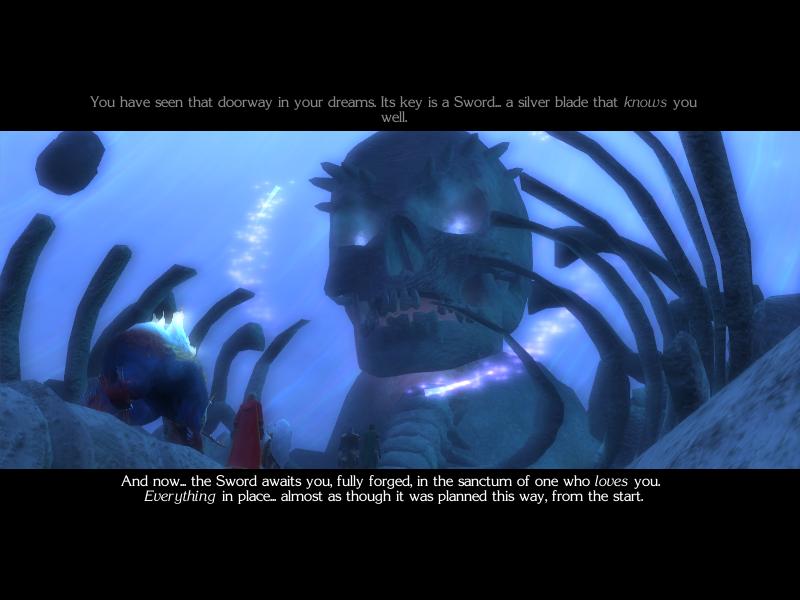
 : Someone planned all this? Who?
: Someone planned all this? Who? : I will let you discover that little morsel on your own, spirit-eater. I will not be there to enjoy the moment, but just knowing it must occur is amusement enough.
: I will let you discover that little morsel on your own, spirit-eater. I will not be there to enjoy the moment, but just knowing it must occur is amusement enough.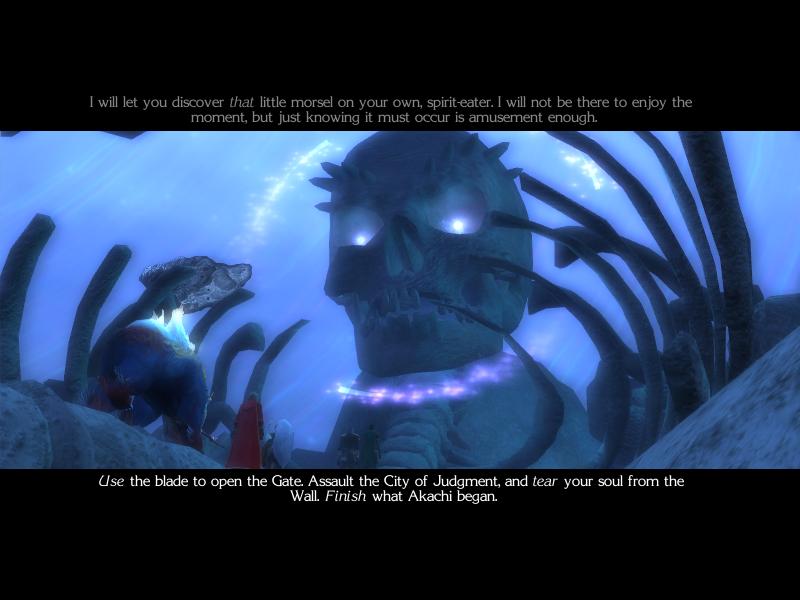
 : Your captains have waited long for your return. When the Gate swings wide, they will come like loyal hounds... tongues lolling from their mouths at the very thought of a new Crusade.
: Your captains have waited long for your return. When the Gate swings wide, they will come like loyal hounds... tongues lolling from their mouths at the very thought of a new Crusade. : I have no intention of leading any new Crusade.
: I have no intention of leading any new Crusade.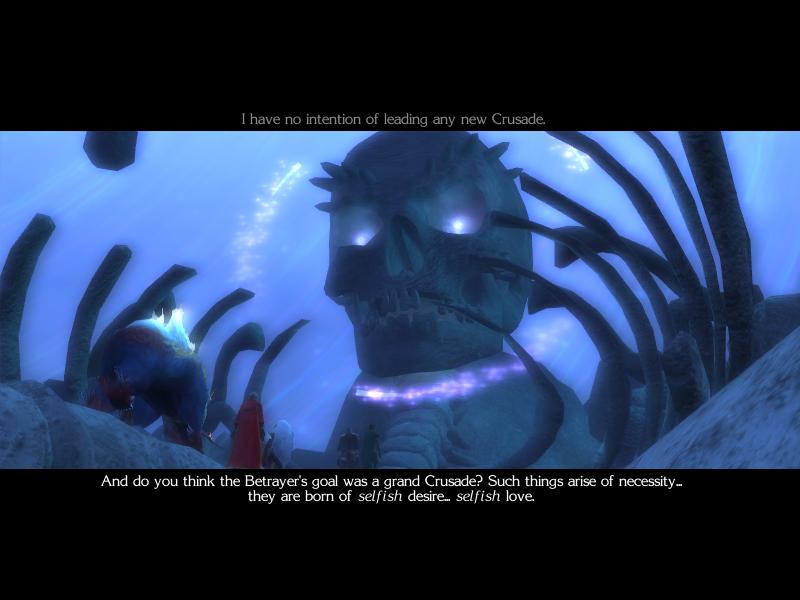
 : The trappings of justice come later... to seduce the gullible... to entice them to die for another man's selfish whim.
: The trappings of justice come later... to seduce the gullible... to entice them to die for another man's selfish whim.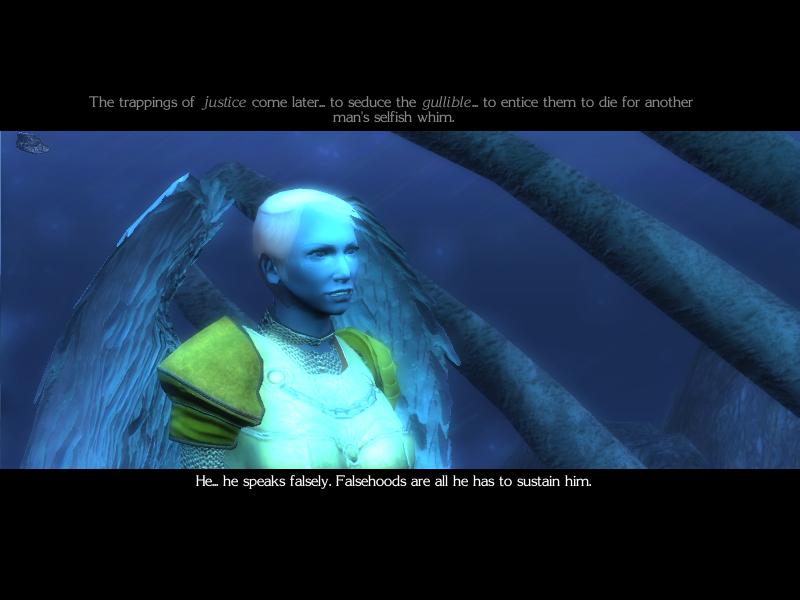
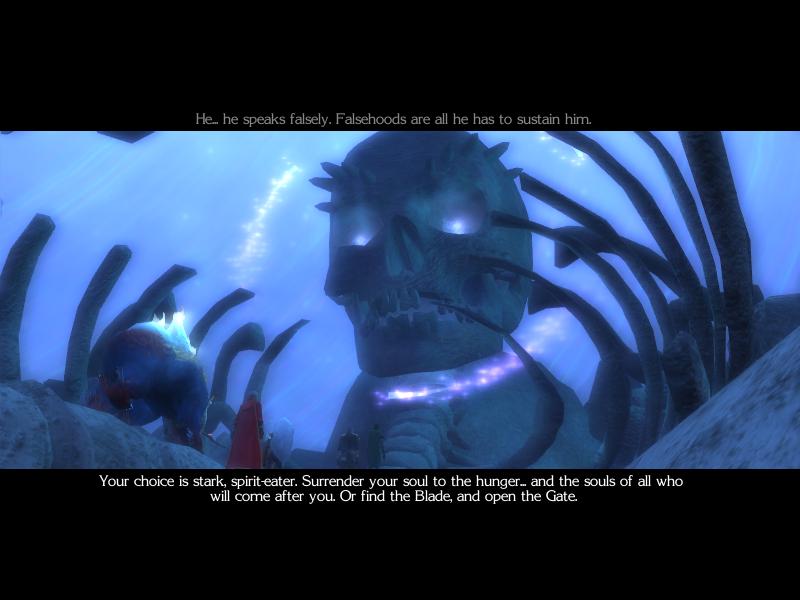
 : Only two portals provide passage from this drifting cairn of mine. One brought you here - the other will lead you to the sanctum where the Blade and your "ally" await.
: Only two portals provide passage from this drifting cairn of mine. One brought you here - the other will lead you to the sanctum where the Blade and your "ally" await.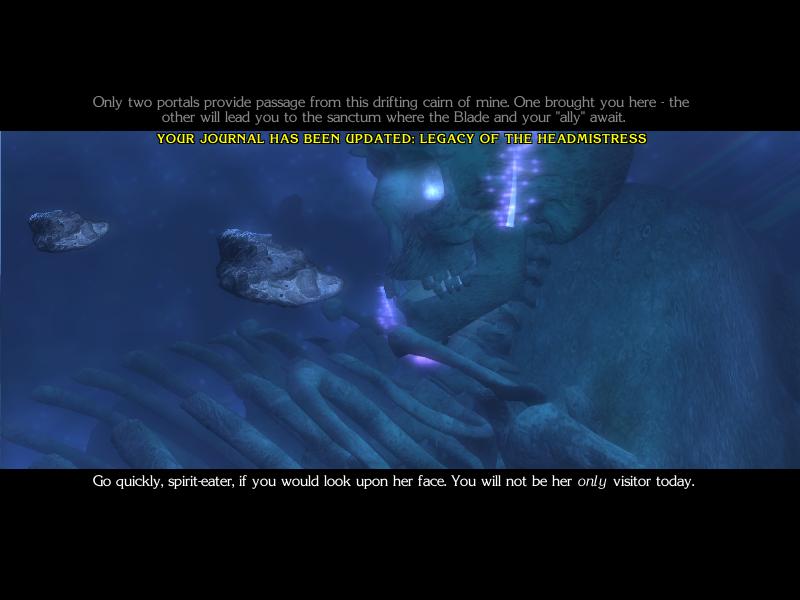
 : [Wisdom/Insight] Araman followed me through the portal. Didn't he?
: [Wisdom/Insight] Araman followed me through the portal. Didn't he? : My hound is clever, is he not? You opened the door, as Araman hoped, and now he follows your ally to her wretched den.
: My hound is clever, is he not? You opened the door, as Araman hoped, and now he follows your ally to her wretched den. : You saw him in your dream of the Gate... saw him for the priest he once was, who served me at his brother's side. And turned against me, at his brother's whim.
: You saw him in your dream of the Gate... saw him for the priest he once was, who served me at his brother's side. And turned against me, at his brother's whim.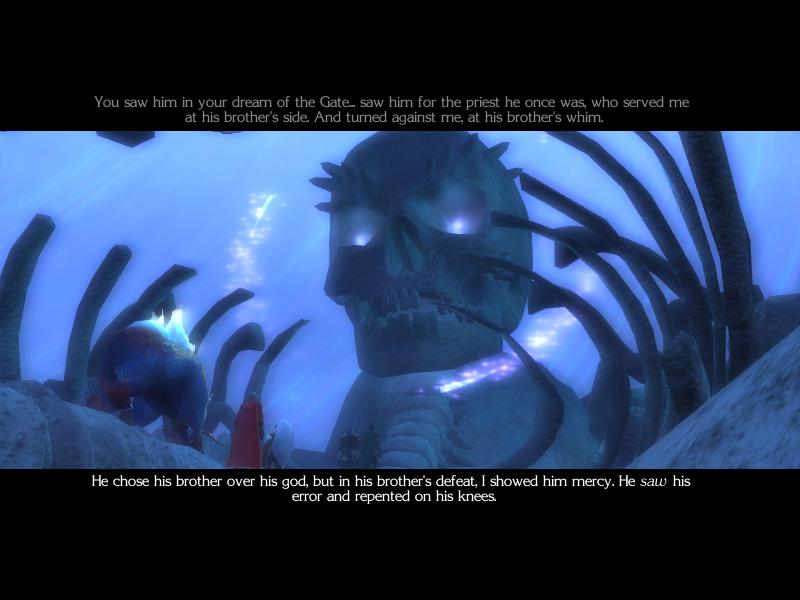
 : Did Araman really repent? Or did you give him some "encouragement"?
: Did Araman really repent? Or did you give him some "encouragement"? : Ah, spirit-eater... perhaps some part of Akachi does still linger in your mind. You know me as he once did.
: Ah, spirit-eater... perhaps some part of Akachi does still linger in your mind. You know me as he once did. : Yes, I ensured that Araman would not betray me again. I set a geas upon him and imprisoned his soul in the City of Judgement... a hostage, until such time as he sends your ally's soul to its rightful place.
: Yes, I ensured that Araman would not betray me again. I set a geas upon him and imprisoned his soul in the City of Judgement... a hostage, until such time as he sends your ally's soul to its rightful place. : Where is Araman's soul now?
: Where is Araman's soul now?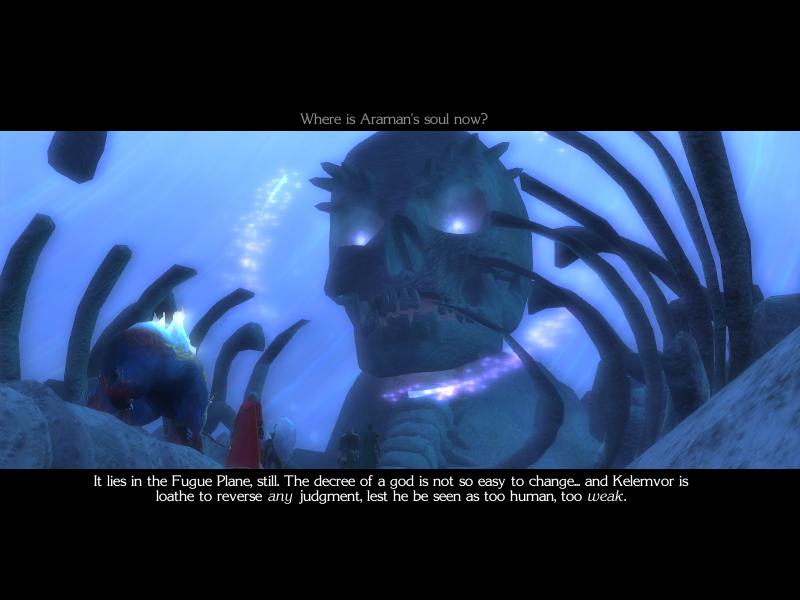
 : And your ally's very existence breaks his law, as well.
: And your ally's very existence breaks his law, as well. : So Araman serves you still? How can he serve a dead god?
: So Araman serves you still? How can he serve a dead god? : His faith in me sustains him. Belief is the currency of the planes, spirit-eater, as your little dove will tell you.
: His faith in me sustains him. Belief is the currency of the planes, spirit-eater, as your little dove will tell you.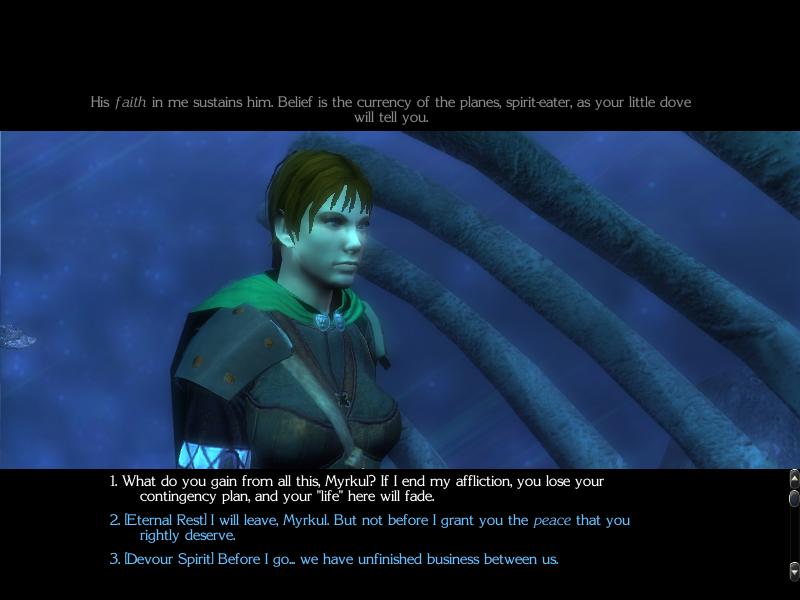
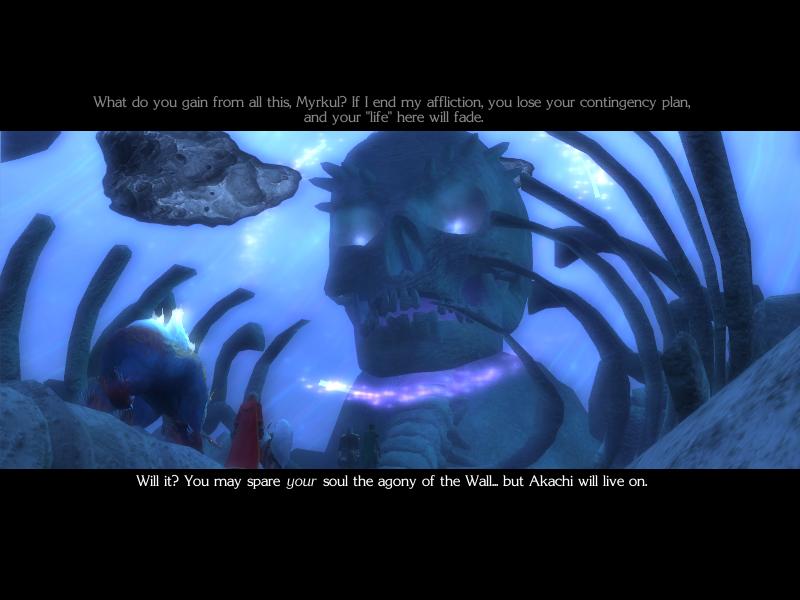
 : His hunger was born of the Wall... born of emptiness. You cannot destroy that which is empty. The spirit-eater will live on, as will I.
: His hunger was born of the Wall... born of emptiness. You cannot destroy that which is empty. The spirit-eater will live on, as will I. : And in assaulting the City of Judgement... I glorify you.
: And in assaulting the City of Judgement... I glorify you. : In everything you do, spirit-eater... you stoke the embers of my soul.
: In everything you do, spirit-eater... you stoke the embers of my soul.* * *
And now we have purpose.
This is the end of Act Two. All that remains now is the inevitable confrontation with the City of Judgement. We're about to raise an army and assault Heaven itself.
Mask was an Epic-level campaign from the outset but it only really becomes epic from this point on. Fighting the spirit army and bringing down the most powerful hags in Rashemen was cool, but it just doesn't compare to Act Three. I mean, look at us: we're standing on the shattered remains of a deity's broken corpse as it drifts through the Astral sea, conversing with the deposed demiurge and plotting how best to overthrow God. How badass is that?
I would just like to note that Mask is not "official" "Forgotten Realms" "canon," a worthless distinction that would otherwise place it on a par with hideous self-insertion fan-fic and tedious soap-opera shenanigans. Officially, Myrkul's spirit resides in a sentient crown that is plotting to take over the world or some such nonsense. Ignoring the fact that it's absurd to create a "canon" for imaginary made-up excuses to throw dice and play elves at other people, Myrkul's deployment here in Mask is far superior thematically than yet another Evil Artifact.
Bitter? Maybe. But people place importance on such things, so...
* * *
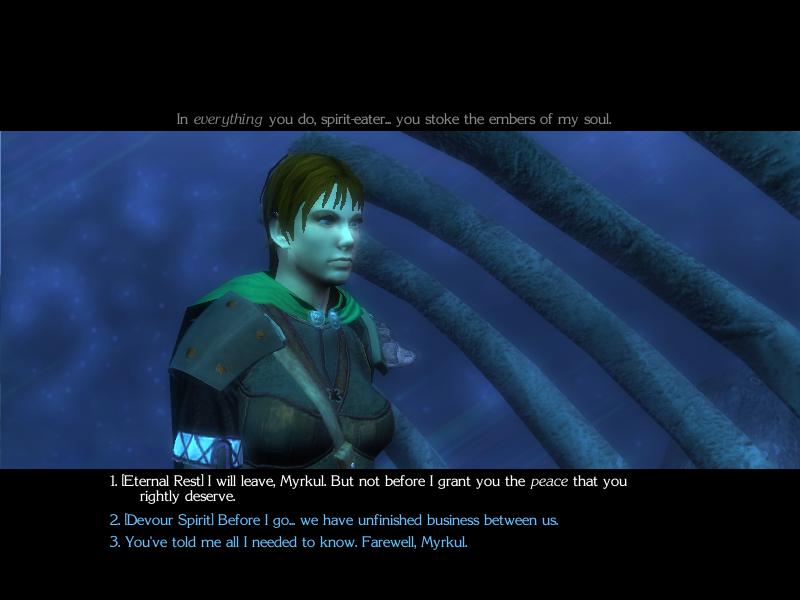
 : Judgement has been too long delayed. Myrkul's time on the Planes is done.
: Judgement has been too long delayed. Myrkul's time on the Planes is done. : It is not yours to dispense judgement, spirit-eater. The hunger of the Wall holds no sway over gods.
: It is not yours to dispense judgement, spirit-eater. The hunger of the Wall holds no sway over gods. : You are wrong. I have discovered a way to grant a final rest to the dead.
: You are wrong. I have discovered a way to grant a final rest to the dead. : A lie. In all you do, you glorify me, spirit-eater... you stoke the embers of my soul.
: A lie. In all you do, you glorify me, spirit-eater... you stoke the embers of my soul. : And now, I will snuff those embers out. Farewell, Myrkul.
: And now, I will snuff those embers out. Farewell, Myrkul.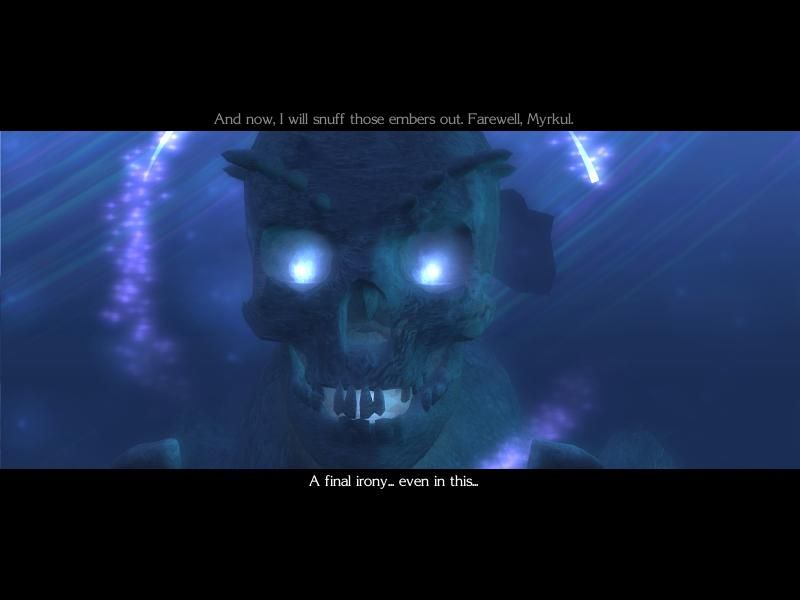
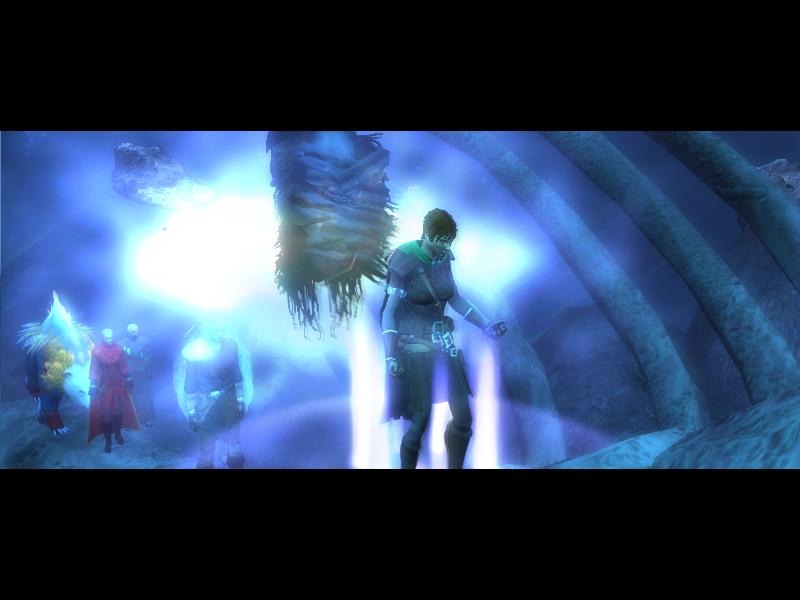
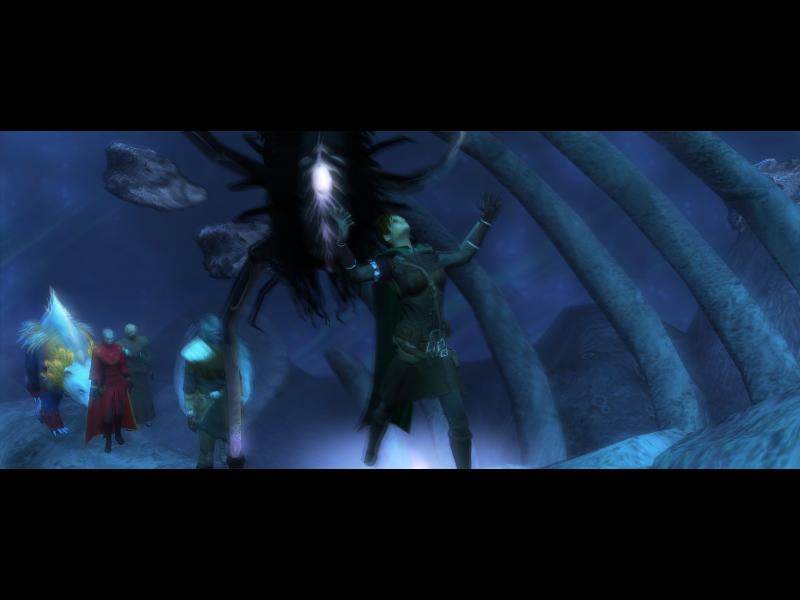
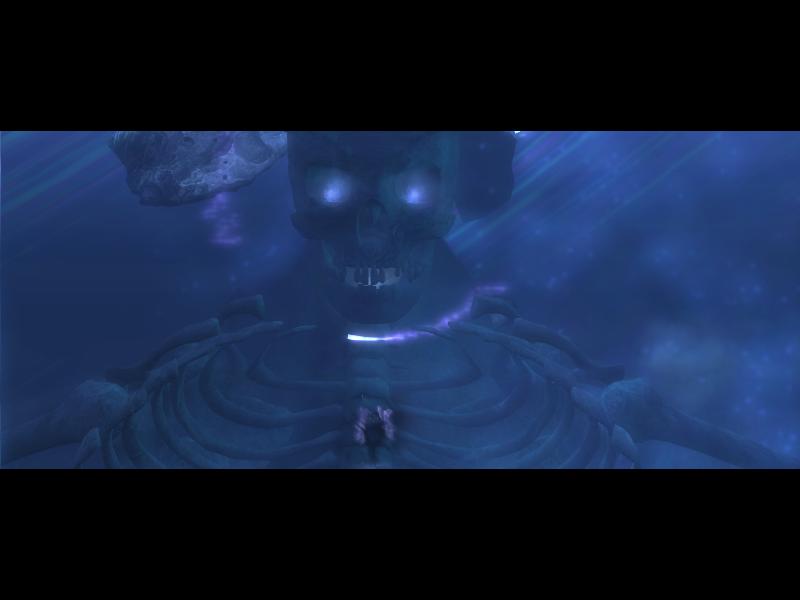
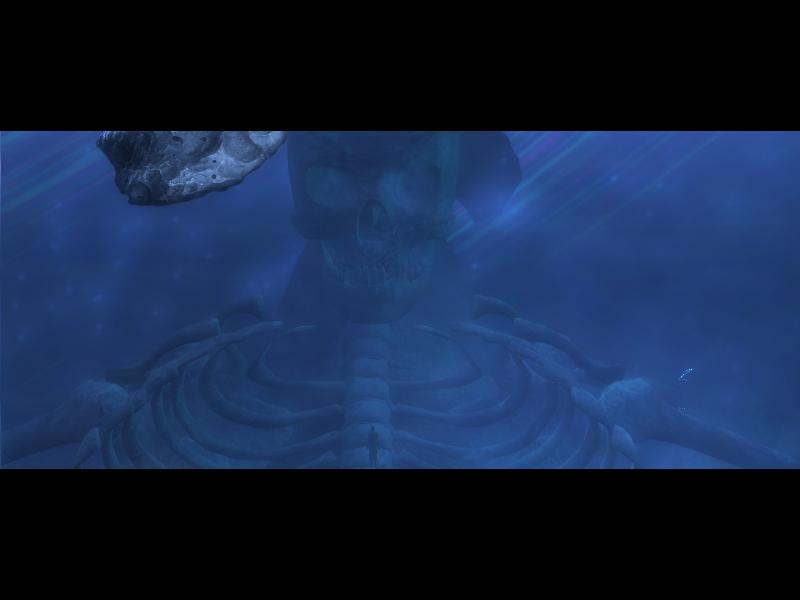
* * *
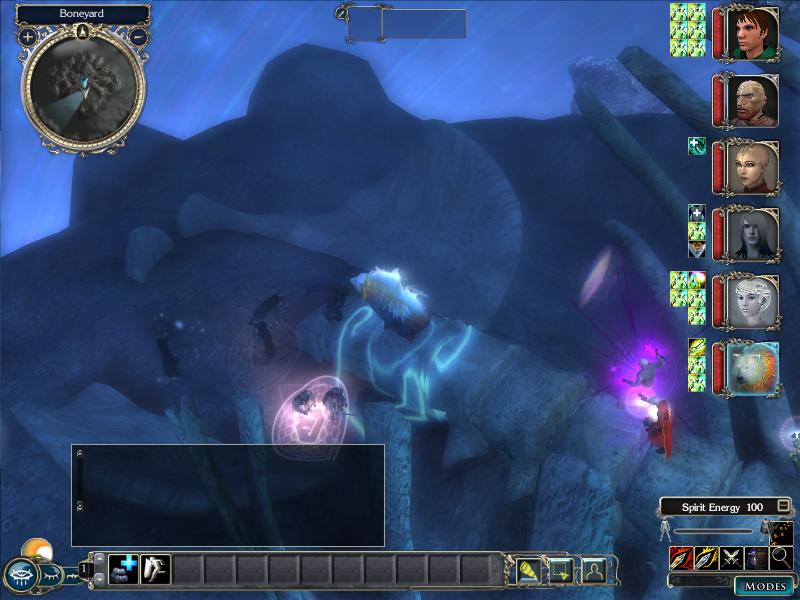
Sarduris and his knights attack us for ending Myrkul. If we'd left Myrkul alive, we'd've been able to convince Sarduris to help us assault the City of Judgement - but killing Myrkul just feels too good.
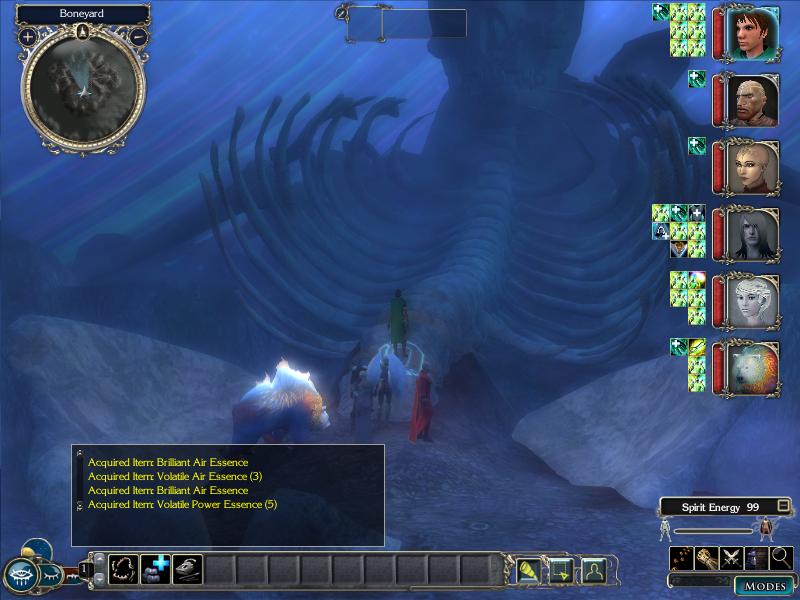
Goodbye, you cold-blooded bastard.
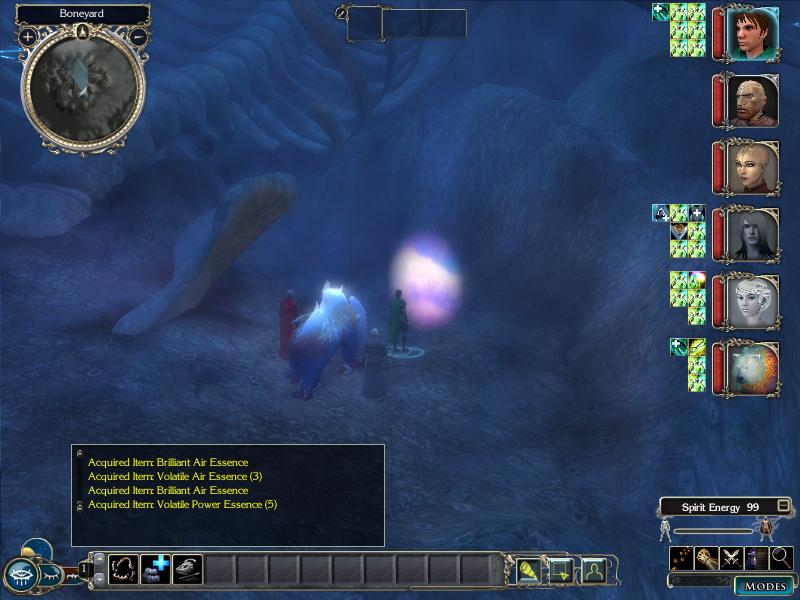
And that is the end of Act Two.